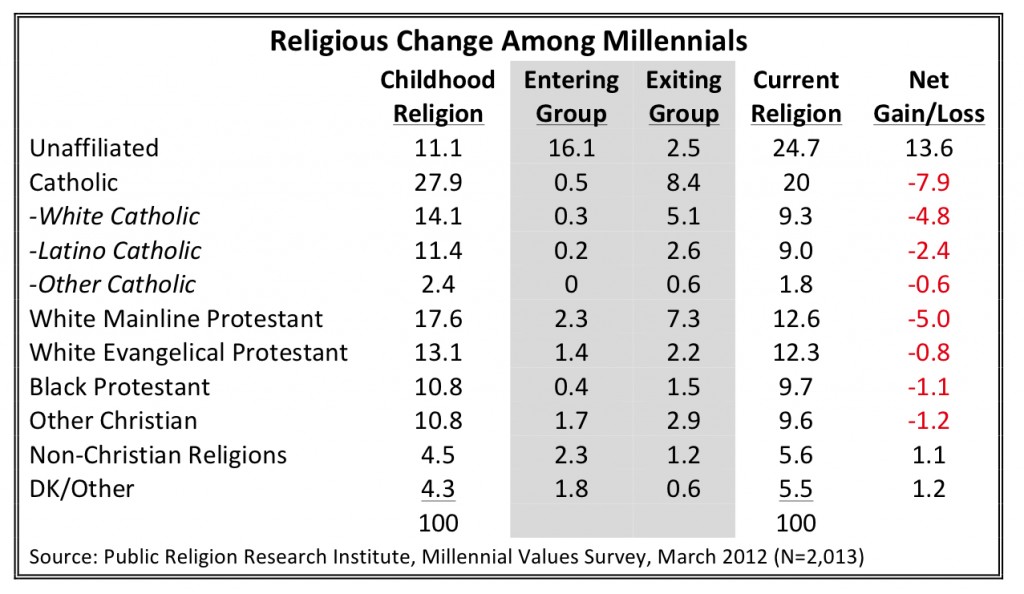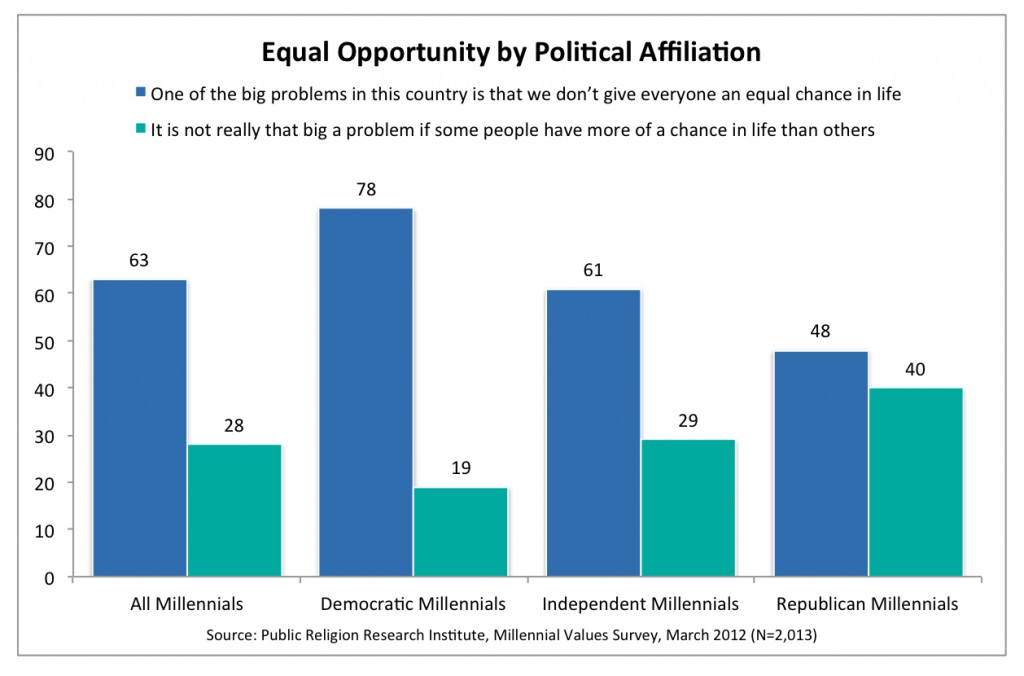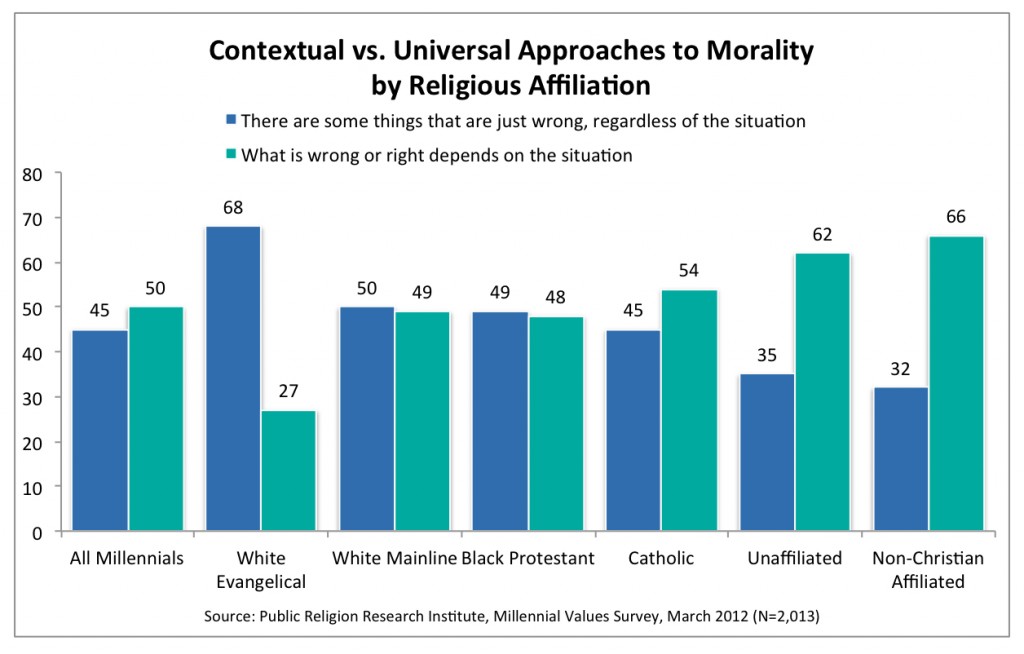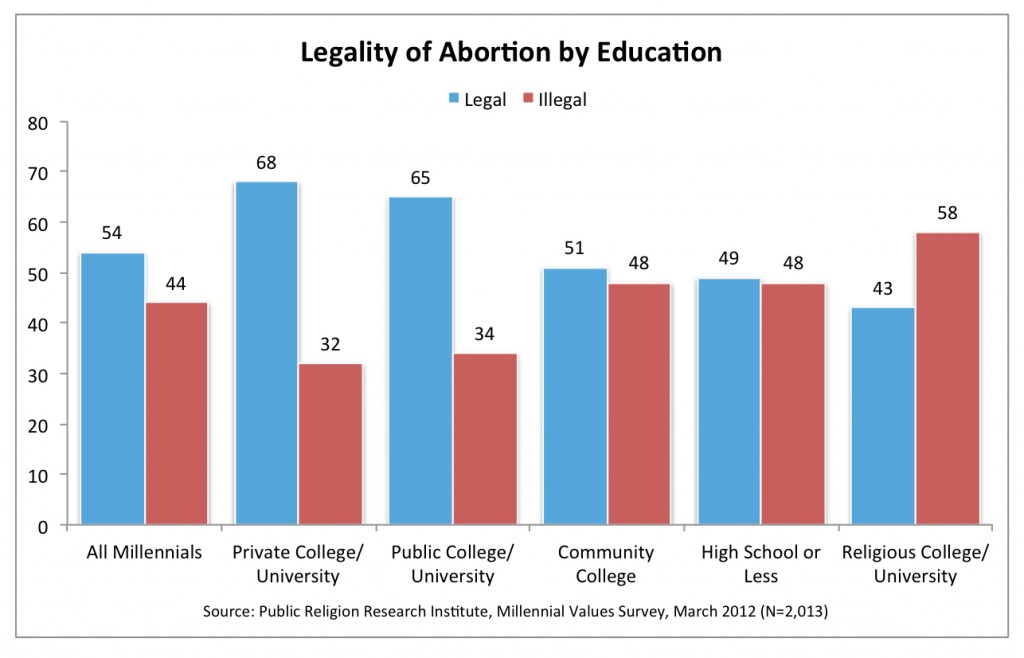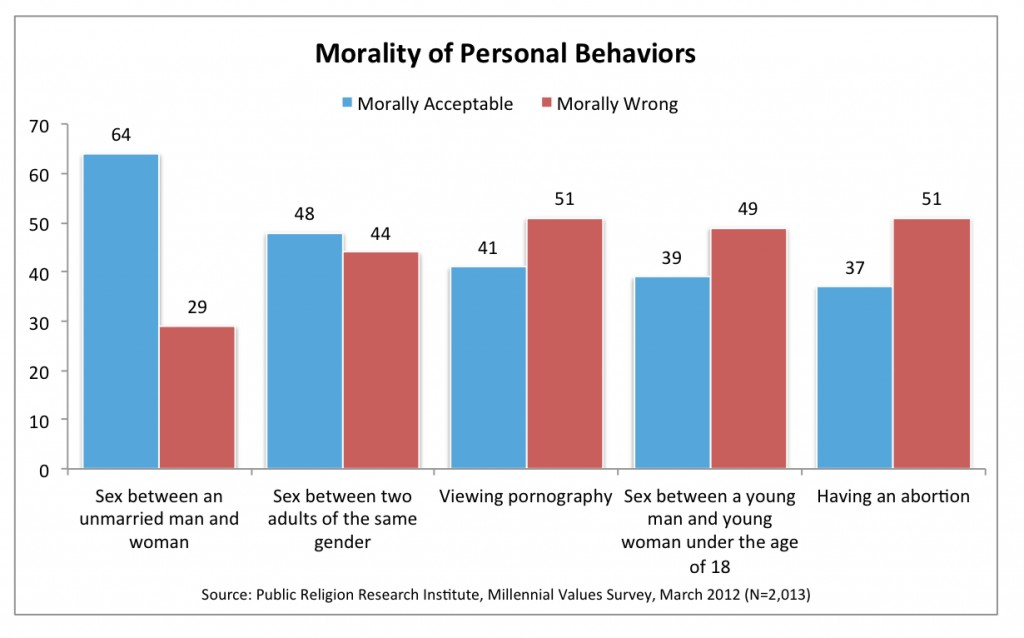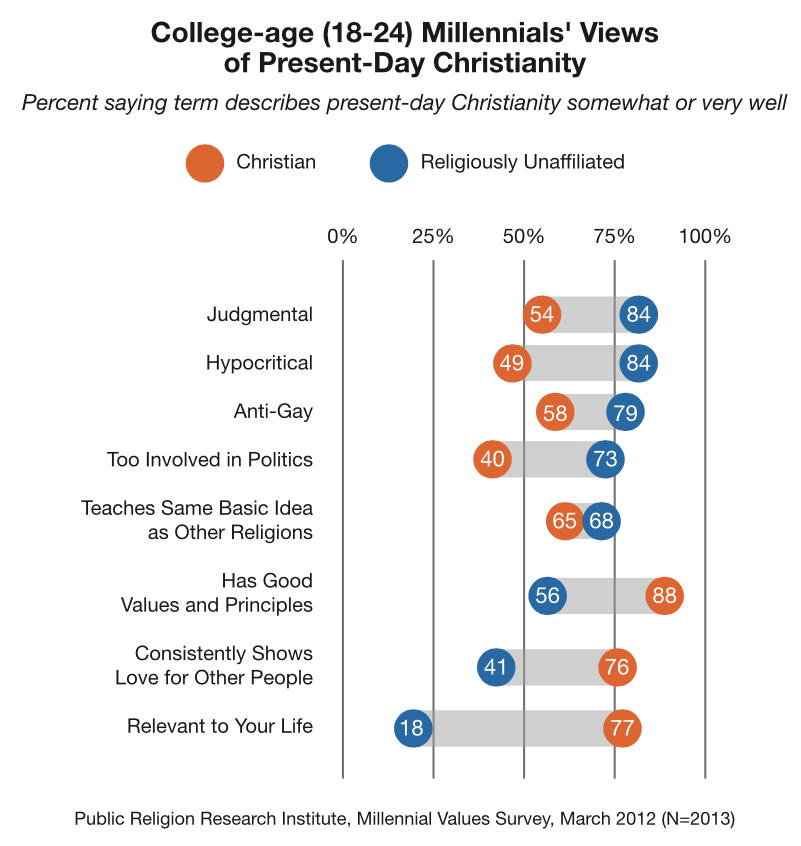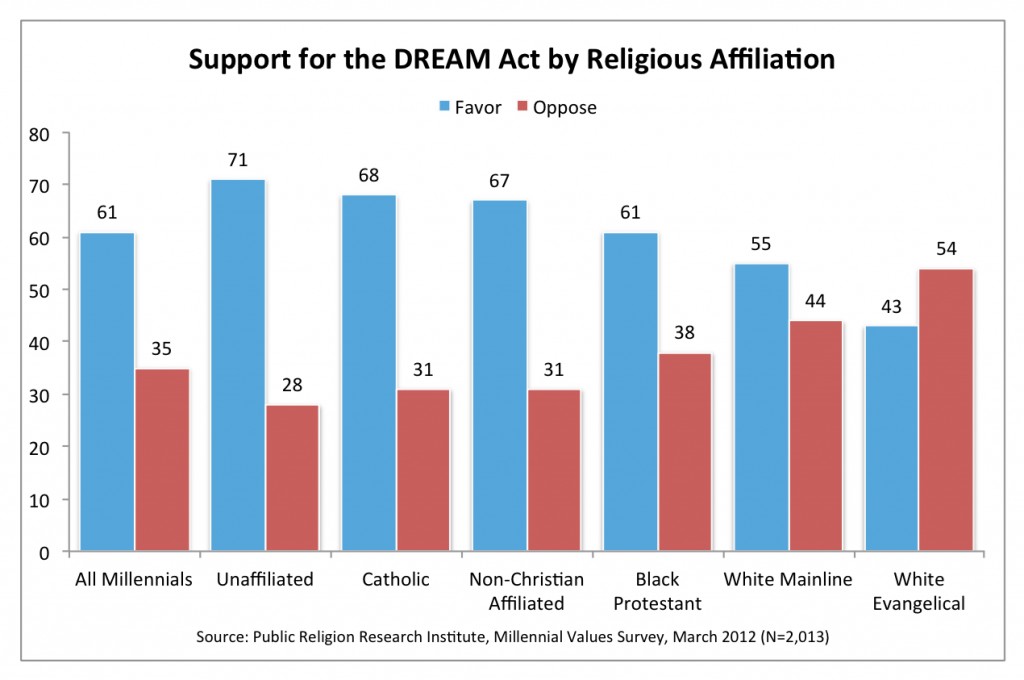Executive Summary
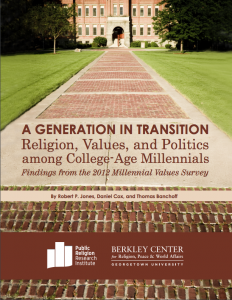 College-age Millennials (age 18-24) are considerably more racially and ethnically diverse than the general population. Fewer than 6-in-10 (57%) Millennials self-identify as white, compared to 72% of the general population. Approximately 1-in-5 (21%) identify as Hispanic, 14% identify as black, 6% identify as some other race, and 3% identify with two or more racial categories.
College-age Millennials (age 18-24) are considerably more racially and ethnically diverse than the general population. Fewer than 6-in-10 (57%) Millennials self-identify as white, compared to 72% of the general population. Approximately 1-in-5 (21%) identify as Hispanic, 14% identify as black, 6% identify as some other race, and 3% identify with two or more racial categories.
When asked to offer one or two words that describe how their generation is different from their parents’ generation, 4-in-10 (40%) younger Millennials describe themselves more negatively than their parents, compared to 19% who describe their own generation more positively, and 40% who give more neutral comments. The most frequently mentioned difference between the generations was a neutral assessment that Millennials are more “tech-savvy” than their parents (16%).
Like Americans overall, college-age Millennials (age 18-24) are most likely to cite jobs and unemployment as a critical issue facing the country. More than three-quarters (76%) say that jobs and unemployment represent a critical issue. Majorities also report that the federal deficit (55%) and education (54%) are critical issues facing the nation. Only about 1-in-5 say that social issues like abortion (22%) or same-sex marriage (22%) are critical issues.
About 6-in-10 (61%) college-age Millennials say they are registered to vote, but fewer than half (46%) say they are absolutely certain they will vote in the 2012 election.
Younger Millennials generally identify as political Independents but lean toward the Democratic Party. A plurality (45%) of younger Millennials identify as Independent, compared to 33% who identify as Democrat and 23% who identify as Republican. Including “leaners,” nearly 6-in-10 (58%) Millennials identify with or lean toward the Democratic Party, compared to 39% who identify with or lean toward the Republican Party. Only 3% report that they do not lean toward either political party.
Among college-age Millennial voters, Barack Obama holds a 7-point lead over a generic Republican candidate at this point in the 2012 presidential campaign. Nearly half (48%) of Millennial voters say they would prefer that Obama win the 2012 election, compared to 41% who say they would like to see a Republican candidate win. Eleven percent say they are not sure or say they would like to see a third-party candidate win the election. Among Millennial voters who favor a Republican candidate, most would prefer it if Mitt Romney or Ron Paul won the nomination (34% and 30% respectively).
- Obama holds a considerable advantage over Mitt Romney in terms of favorability and excitement about his candidacy. A majority (52%) of college-age Millennial voters say they have a favorable opinion of Barack Obama, compared to only 32% who have a favorable view of Romney. More than 7-in-10 (72%) Obama supporters say that they would be excited to cast a vote for him, compared to 54% of Romney supporters who say they would be excited to vote for him.
- Barack Obama holds overwhelming leads over a generic Republican opponent among black Millennial voters (92% vs. 2% respectively) and Hispanic Millennial voters (61% vs. 28% respectively). In contrast, a majority (55%) of white Millennial voters say they would prefer that a Republican candidate win the 2012 election, compared to one-third (33%) who say they would like to see Obama win re-election.
Younger Millennials report significant levels of movement from the religious affiliation of their childhood, mostly toward identifying as religiously unaffiliated. While only 11% of Millennials were religiously unaffiliated in childhood, one-quarter (25%) currently identify as unaffiliated, a 14-point increase. Catholics and white mainline Protestants saw the largest net losses due to Millennials’ movement away from their childhood religious affiliation.
- Today, college-age Millennials are more likely than the general population to be religiously unaffiliated. They are less likely than the general population to identify as white evangelical Protestant or white mainline Protestant.
- Millennials also hold less traditional or orthodox religious beliefs. Fewer than one-quarter (23%) believe that the Bible is the word of God and should be taken literally, word for word. About 1-in-4 (26%) believe Bible is the word of God, but that not everything in the Bible should be taken literally. Roughly 4-in-10 (37%) say that the Bible is a book written by men and is not the word of God.
Younger Millennials are divided on whether the American Dream – the idea that if you work hard you’ll get ahead – holds true today. They are moderately optimistic about their long-term financial prospects, when they use their parents’ financial situation as a point of comparison.
- A plurality (45%) of younger Millennials believe that the American Dream once held true, but not anymore, while 4-in-10 (40%) say the American Dream still holds true. One-in-ten (10%) younger Millennials say that the American Dream never held true.
- Approximately 4-in-10 (42%) of younger Millennials believe that, in their lifetime, they will be better off than their parents, compared to 18% who expect to be less well off than their parents, and 38% who predict that their financial situation will be about the same as their parents’.
College-age Millennials see the need for economic reform to address the gap between the rich and the poor.
- Nearly three-quarters (73%) of college-age Millennials agree that the economic system in this country unfairly favors the wealthy, while (24%) disagree. Majorities of members of all political parties agree: 85% of Democratic Millennials, 71% of Independent Millennials, and 59% of Republican Millennials.
- A strong majority (63%) of younger Millennials agree that one of the big problems in this country is that we don’t give everyone an equal chance in life. Approximately 3-in-10 (28%) disagree, saying that it is not really that big a problem if some people have more of a chance in life than others.
- Nearly 7-in-10 (69%) Millennials believe that the government should do more to reduce the gap between the rich and the poor, while 28% disagree.
- Younger Millennials strongly favor (72%) a policy sometimes called the “Buffett Rule,” which would increase the tax rate on Americans earning more than $1 million a year. Majorities of Republican, Independent and Democratic Millennials support the “Buffett Rule.”
Despite holding some moral reservations about abortion, a majority of college-age Millennials support legal abortion, as well as community access to abortion services.
- A majority of college-age Millennials say that abortion should be legal in all (24%) or most cases (30%). More than 4-in-10 say that abortion should be illegal in most (28%) or all cases (16%). Roughly 6-in-10 (59%) Millennials believe that at least some health care professionals in their community should provide legal abortions.
- A slim majority (51%) of Millennials believe that having an abortion is morally wrong, compared to 37% who say it is morally acceptable.
Although younger Millennials are divided on the morality of gay and lesbian sexual relationships, a solid majority support allowing gay and lesbian couples to marry legally.
- Nearly 6-in-10 (59%) college-age Millennials favor allowing gay and lesbian couples to legally marry, compared to 37% who are opposed.
- Millennials are nearly evenly divided over whether sex between two adults of the same gender is morally acceptable (48%) or morally wrong (44%).
Younger Millennials strongly support the central components of the DREAM Act – allowing illegal immigrants brought to the U.S. as children to gain legal resident status if they join the military or go to college (61% favor, 35% oppose). Two-thirds (66%) of Democratic Millennials support the policy, compared to fewer than half (49%) of Republican Millennials.
Despite the Millennial generation’s racial and ethnic diversity, there is evidence of considerable racial tensions among younger Millennials, which also run along party lines.
- College-age Millennials are divided on whether the government has paid too much attention to the problems of blacks and other minorities over the past few decades (49% disagree, 46% agree).
- When asked whether discrimination against whites has become as big a problem today as discrimination against blacks, younger Millennials are nearly evenly divided (48% agree, 47% disagree). Almost two-thirds (66%) of Republican Millennials agree that discrimination against whites has become as big a problem as discrimination against blacks and other minorities, compared to only 36% of Democratic Millennials.
Millennials’ feelings toward present-day Christianity are fairly ambivalent. Approximately three-quarters (76%) of younger Millennials say that modern-day Christianity “has good values and principles,” and 63% agree that contemporary Christianity “consistently shows love for other people.” On the other hand, nearly two-thirds (64%) of Millennials say that “anti-gay” describes present-day Christianity somewhat or very well. And more than 6-in-10 (62%) Millennials also believe that present-day Christianity is “judgmental.”
I. College-Age Millennials: A Brief Profile of a Generation in Transition
The 2012 Millennial Values Survey focuses on the youngest cohort of American adults, age 18-24. Conducted by Public Religion Research Institute and the Georgetown University’s Berkley Center for Religion, Peace, and World Affairs, the survey provides an in-depth portrait of younger Millennials’ views on faith, values, and the 2012 election.
The survey of 2,000 college-age Millennials provides a new lens for examining the moral and religious values that animate young adults, and how these values impact their views and voting preferences on a range of issues including religious pluralism, social and economic inequality, immigration, and issues of race and gender. The survey also provides insights into younger Millennials’ outlook on the future, as well as their feelings about present-day Christianity, and explores the significant shifts between Millennials’ current religious affiliation and the religious tradition in which they were raised. 1
Generally, the survey paints a portrait of a complex generation in transition. These younger Americans still have close ties with their parents. Strong majorities speak with their parents every day, and nearly half live at home. However, they are less religious than the general public, and for many, their religious identities are already shifting away from their childhood religion. They are less actively engaged in the electoral process than older adults, with only half saying they are absolutely certain they will vote in the 2012 election and nearly 1-in-4 reporting they could not offer an opinion about Mitt Romney, the likely Republican presidential nominee. They are strongly supportive of proposals to reduce economic inequality, but they hold concerns about reverse discrimination and dependence on government social programs. Perhaps most significantly, this cohort is still in the midst of educational formation. The survey finds significant differences of opinion not only between those with different levels of educational attainment, but also between those who have attended different types of colleges and universities.
Education, Race/Ethnicity, and Region
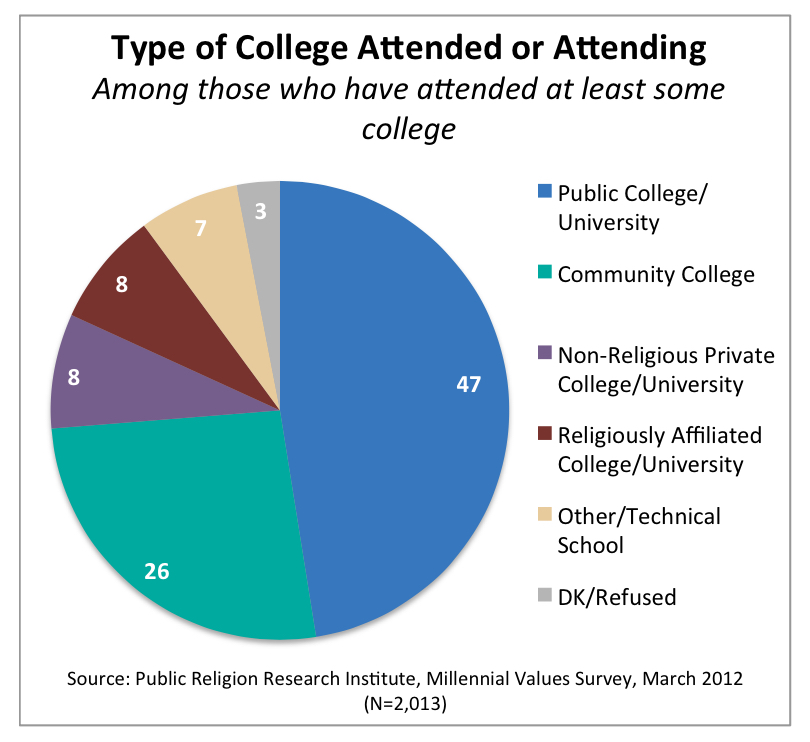 Most college-age Millennials are still in the process of completing their education. Only 11% of college-age Millennials (age 18-24) have completed a bachelor’s degree or at least some graduate school. A plurality (45%) have completed some college but have not received a bachelor’s degree, compared to 28% who report that they have completed high school and 16% who report that they have less than a high school education. Among those who are currently attending college or who have graduated from college, nearly half (47%) attended or are currently attending a public college or university, 26% attend or attended a community college, 8% attend or attended a non-religious private college or university, and 8% attend or attended a religiously affiliated college or university.
Most college-age Millennials are still in the process of completing their education. Only 11% of college-age Millennials (age 18-24) have completed a bachelor’s degree or at least some graduate school. A plurality (45%) have completed some college but have not received a bachelor’s degree, compared to 28% who report that they have completed high school and 16% who report that they have less than a high school education. Among those who are currently attending college or who have graduated from college, nearly half (47%) attended or are currently attending a public college or university, 26% attend or attended a community college, 8% attend or attended a non-religious private college or university, and 8% attend or attended a religiously affiliated college or university.
Millennials report a wide range of debt incurred to attend college. Among those who have graduated from a four-year college or university, 14% report borrowing more than $50,000, nearly one-quarter (24%) report borrowing between $20,000 and $50,000, and 28% report borrowing less than $20,000. Twenty-nine percent say they did not borrow any money to finance their undergraduate college education.
Millennials are also considerably more diverse than the general population. More than 7-in-10 (72%) American adults identify as white.2 In contrast, fewer than 6-in-10 (57%) Millennials self-identify as white.3 Approximately 1-in-5 (21%) identify as Hispanic, 14% identify as black, 6% identify as some other race, and 3% identify with 2 or more racial categories.
The geographic distribution of college-age Millennials is roughly similar to the general population. They are most heavily concentrated in the South (35%), followed by the West (25%), the Midwest (22%), and the Northeast (18%).
Party Identification and Political Ideology
Compared to the general public, younger Millennials are more likely to identify as liberal and politically Independent. A plurality (45%) of younger Millennials identify as Independent, compared to 33% who identify as Democrat and 23% who identify as Republican. However, when asked whether they lean more toward one party or the other, Millennials are significantly more likely to lean toward the Democratic Party than the Republican Party. Nearly 6-in-10 (58%) Millennials identify with or lean toward the Democratic Party, compared to 39% who identify with or lean toward the Republican Party. Despite these partisan disparities, younger Millennials are nearly evenly divided between self-identified political conservatives and liberals. A plurality (44%) identify as moderate, 27% identify as liberal, and 25% identify as conservative.
Like Americans overall, Millennial Republicans are much more likely to be ideologically homogeneous than Millennial Democrats. For example, nearly two-thirds (65%) of Millennial Republicans identify as conservative, compared to 30% who identify as moderate and only 3% who identify as liberal. In contrast, fewer than half (46%) of Millennial Democrats identify as liberal, compared to 42% who identify as moderate and 10% who identify as conservative.
Religious Identification: Present Religion vs. Childhood Religion
College-age Millennials (age 18-24) are more likely than the general population to be religiously unaffiliated. One-quarter (25%) of Millennials identify as religiously unaffiliated. One-in-five (20%) identify as Catholic, which is roughly equivalent to the proportion in the general population. However, among Millennial Catholics less than half are white. Among all Millennials 9% are white Catholic, while an equal number (9%) are Hispanic Catholic and 2% are some other race or mixed race Catholic. Roughly equal numbers of Millennials identify as white mainline Protestant (13%), white evangelical Protestant (12%), and black Protestant (10%). One-in-10 (10%) identify as some other type of Christian, and 6% identify with a non-Christian religion.4
Despite their relatively young age, Millennials report significant levels of movement from the religious affiliation of their childhood. By far, the group seeing the highest increase in membership due to this movement is the religiously unaffiliated. While only 11% of Millennials were religiously unaffiliated in childhood, one-quarter (25%) currently identify as unaffiliated, a 14-point increase. This means that most of today’s religiously unaffiliated Millennials were raised in a specific religious tradition. Among those who are currently unaffiliated, 35% were raised unaffiliated, 21% were raised white mainline Protestant, 23% Catholic, 8% other Christian, and 4% non-Christian affiliated. Those who were raised white evangelical Protestant or black Protestant make up only 4% each of Millennials who are currently unaffiliated.
Catholics and white mainline Protestants saw the largest net losses due to changes in religious identity. Overall, the percentage of Millennials identifying as Catholic dropped by 8 points, from a childhood affiliation of 28% to only 20% today. Most former Catholics now identify as unaffiliated, a movement that is more pronounced among whites. Among white Millennials who were raised Catholic, fewer than two-thirds (64%) remain Catholic, while one-quarter (25%) now identify as unaffiliated, and approximately 1-in-10 (11%) now identify with another religious group.
The percentage of younger Millennials identifying as mainline Protestant dropped by 5 points, from a childhood affiliation of 18% to 13% today. Most former white mainline Protestants now also identify as unaffiliated. Among whites who were raised mainline Protestant, fewer than 6-in-10 (59%) remain mainline Protestant, while nearly 3-in-10 (29%) now identify as unaffiliated, and approximately 1-in-10 (12%) currently identify with another religious group.
Ethnic minority religious groups saw far fewer losses than white religious groups. Latino Catholics saw a net loss of only two percentage points, and black Protestants saw a loss of only one percentage point. The only religious group, other than the religiously unaffiliated, to experience a net gain due to Millennials’ religious movement was the subcategory of non-Christian religions, which increased by 1 percentage point.
Relationship with Parents
College-age Millennials report strong ties with their parents. Six-in-ten (60%) say that they talk with their parents at least once a day, and 25% talk to them once or twice a week. Fewer than 1-in-10 (8%) say they talk with their parents a few times a month, and only 5% say they seldom or never talk with their parents.
At least one reason why younger Millennials frequently speak with their parents is that nearly half (48%) are living at home. However, even among those Millennials living on their own, nearly 8-in-10 report that they talk with their parents at least once a day (36%) or once or twice a week (41%). Millennial men are significantly more likely to report living at home with their parents than Millennial women (56% vs. 41% respectively), but both men and women talk to their parents with about the same frequency.
When asked to offer one or two words that describe how their generation is different from their parents’ generation, college-age Millennials are twice as likely to offer a negative, rather than positive, remark. Four-in-ten (40%) offer negative comments, compared to 19% who give positive comments and 40% who respond more neutrally. The most frequently mentioned difference between the generations was a neutral assessment that Millennials are more “tech-savvy” than their parents (16%). Among the negative evaluations, younger Millennials most frequently cast themselves as “lazier” (8%) and more “entitled” (5%) than their parents. One respondent illustrated these observations by mentioning “participation trophies” as a hallmark of his generation. Six percent also volunteered that Millennials are less religious and less moral than their parents. There were, however, some positive evaluations. Younger Millennials see themselves as more “open-minded” and “tolerant” (6%), and “better educated” and more “worldly” (5%) than their parents.
Outlook on the Future
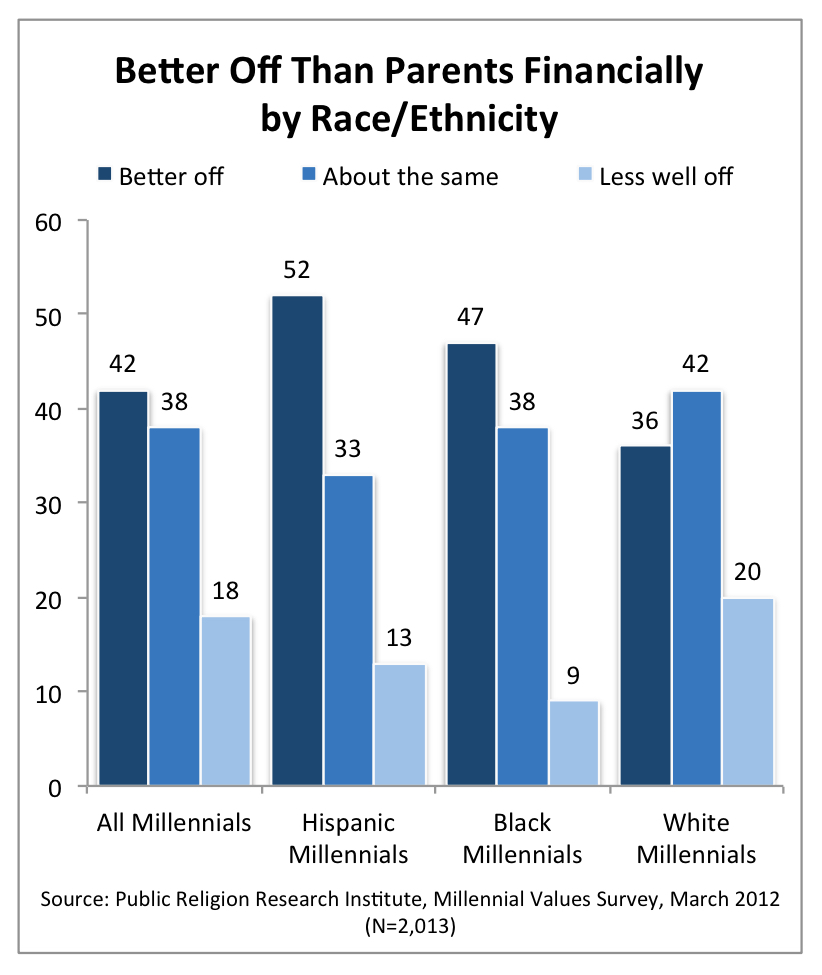 Younger Millennials are divided on whether the economy will improve in the near future. Approximately 4-in-10 (38%) predict that the economy will get better over the next two years, while 27% say it will get worse, and 35% say it will remain about the same. This short-term economic outlook is closely tied to partisan attachment. Nearly 6-in-10 (57%) of Democratic Millennials say that the economy will improve in the next two years, compared to 24% of Republican Millennials. Politically Independent Millennials are roughly evenly divided, with 31% reporting that the economy will get better, 30% saying it will get worse, and 37% predicting that it will stay about the same.
Younger Millennials are divided on whether the economy will improve in the near future. Approximately 4-in-10 (38%) predict that the economy will get better over the next two years, while 27% say it will get worse, and 35% say it will remain about the same. This short-term economic outlook is closely tied to partisan attachment. Nearly 6-in-10 (57%) of Democratic Millennials say that the economy will improve in the next two years, compared to 24% of Republican Millennials. Politically Independent Millennials are roughly evenly divided, with 31% reporting that the economy will get better, 30% saying it will get worse, and 37% predicting that it will stay about the same.
Millennials are fairly optimistic about their long-term financial prospects, when they use their parents’ financial situation as a point of comparison. Approximately 4-in-10 (42%) believe that, in their lifetime, they will be better off than their parents, compared to 18% who expect to be less well off than their parents, and 38% who predict that their financial situation will be about the same as their parents’. Unlike their short-term economic outlook, Millennials’ long-term economic outlook is not tied to party affiliation. Instead, there is a significant racial and ethnic divide. A majority (52%) of Hispanic Millennials and nearly half (47%) of black Millennials say that they will be better off financially than their parents, compared to fewer than 4-in-10 (36%) white Millennials.
On the broader question of career satisfaction, college-age Millennials express fairly high levels of concern. Two-thirds of younger Millennials say they are somewhat worried (43%) or very worried (23%) about finding a rewarding or satisfying career, while only about one-third who say they are not too worried (24%) or not at all worried (8%). Hispanic Millennials express more concern about their ability to find a satisfying career than Millennials of other ethnic or racial backgrounds. Nearly three-quarters (74%) of Hispanic Millennials say they are somewhat or very worried about finding a rewarding career, compared to 65% of white Millennials and 62% of black Millennials.
There are no substantive differences in gender on this question. Millennial men and women are about equally as likely to express concern about finding a satisfying career.
Social Media and Legacy Media
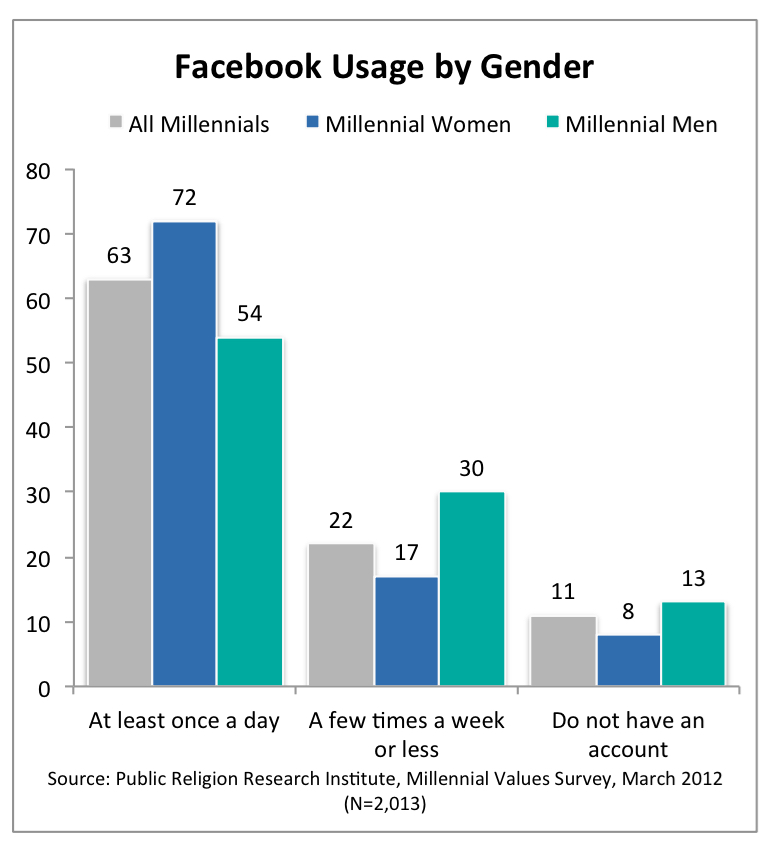 The widespread use of technology is one of the defining traits of the Millennial generation. Among social media outlets, Facebook visibly dominates Millennials’ attention. Only about 1-in-10 (11%) Millennials report that they do not have a Facebook account, compared to a majority (53%) who say they do not have a Twitter account, and nearly three-quarters (73%) who report that they do not have a Tumblr account. More than 6-in-10 (63%) of Millennials report that they use Facebook at least once a day, including nearly half (49%) who say they use it several times a day. In contrast, only 16% say they use Twitter at least once a day, and only 5% say the same of Tumblr.
The widespread use of technology is one of the defining traits of the Millennial generation. Among social media outlets, Facebook visibly dominates Millennials’ attention. Only about 1-in-10 (11%) Millennials report that they do not have a Facebook account, compared to a majority (53%) who say they do not have a Twitter account, and nearly three-quarters (73%) who report that they do not have a Tumblr account. More than 6-in-10 (63%) of Millennials report that they use Facebook at least once a day, including nearly half (49%) who say they use it several times a day. In contrast, only 16% say they use Twitter at least once a day, and only 5% say the same of Tumblr.
There are significant differences in Facebook usage by gender and party identification. More than 7-in-10 (72%) Millennial women report that they use Facebook at least once a day, compared to 54% of men. Roughly 7-in-10 Republican (70%) and Democratic (68%) Millennials say they use Facebook at least daily, compared to 58% of Independent Millennials.
When younger Millennials go online for information about current events and politics, they turn to Yahoo.com (23%) more frequently than any other single website. Approximately 1-in-10 say they most rely on Google.com (11%) or CNN.com (11%). Only 1% of Millennials say they use traditional legacy broadcast news sites such as ABC.com, NBC.com, and CBS.com. About 1-in-5 (19%) say they do not follow current events and politics online.
With regard to television news, Millennials’ most trusted sources for accurate information on current events and politics are broadcast network news (17%), CNN (15%), and Fox News (15%). Six percent name Comedy Central’s “Daily Show With Jon Stewart,” 4% cite MSNBC, and 3% mention public television (PBS). Approximately 3-in-10 (31%), however, say they do not watch television news. Republican Millennials are three times as likely as Democratic Millennials to cite Fox News as their most trusted source of accurate information on current events and politics (27% vs. 9% respectively), while Democratic Millennials are more likely than Republican Millennials to say they trust CNN (22% vs. 10% respectively).
II. Critical Issues Facing the Country
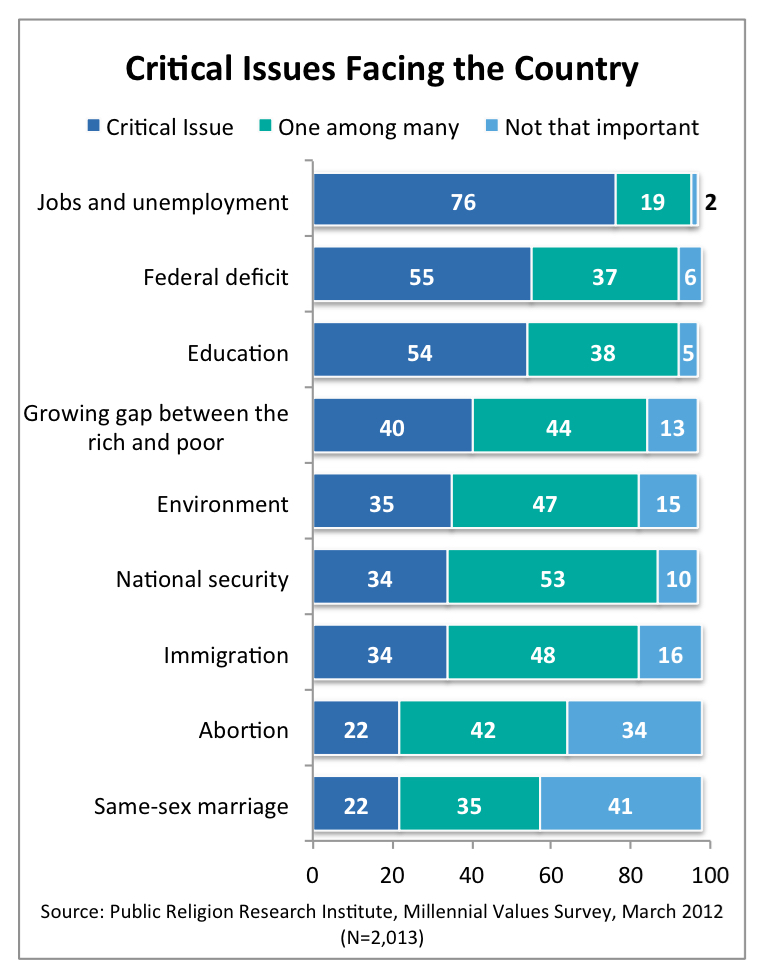 Like Americans overall, college-age Millennials (age 18-24) are most likely to cite jobs and unemployment as a critical issue facing the country. More than three-quarters (76%) say that jobs and unemployment are a critical issue, and majorities also report that the federal deficit (55%) and education (54%) are critical issues facing the nation. Four-in-ten say that the growing gap between the rich and poor is a critical issue. Roughly one-third of Millennials name the environment (35%), immigration (34%), and national security (34%) as critical issues. Approximately 1-in-5 say that abortion (22%) and same-sex marriage (22%) are critical issues.
Like Americans overall, college-age Millennials (age 18-24) are most likely to cite jobs and unemployment as a critical issue facing the country. More than three-quarters (76%) say that jobs and unemployment are a critical issue, and majorities also report that the federal deficit (55%) and education (54%) are critical issues facing the nation. Four-in-ten say that the growing gap between the rich and poor is a critical issue. Roughly one-third of Millennials name the environment (35%), immigration (34%), and national security (34%) as critical issues. Approximately 1-in-5 say that abortion (22%) and same-sex marriage (22%) are critical issues.
Millennials’ issue priorities differ substantially by race, ethnicity, and political affiliation. Black Millennials (63%) are more likely than white (53%) Millennials to say that education is a critical issue. In contrast, Hispanic Millennials (49%) are significantly more likely than white (32%) and black (23%) Millennials to say that immigration is a critical issue. Meanwhile, white Millennials (62%) are more likely than black (50%) or Hispanic (41%) Millennials to say that the federal deficit is a critical issue.
There are also dramatic differences between Democratic and Republican Millennials. Millennial Democrats are nearly twice as likely as Republicans to say that the environment is a critical issue (43% vs. 22% respectively) and much more likely to say that the growing gap between the rich and poor is a critical issue (45% vs. 29% respectively). In contrast, Republican Millennials are more likely than Democratic Millennials to prioritize immigration (47% vs. 29% respectively) and the federal deficit (66% vs. 56% respectively).
III. The 2012 Vote
Likelihood of Voting in the 2012 Election
Approximately 6-in-10 college-age Millennials say they are registered to vote, either at their present address (49%) or at a different address (12%). One-third of Millennials report that they are not currently registered to vote.
There are stark differences in registration status between white, black, and Hispanic Millennials. Roughly two-thirds of white and black Millennials report that they are registered either at their current address or a different address (67% and 66% respectively). Only about 4-in-10 (41%) Hispanic Millennials say they are registered to vote at any location, while 45% say they are not registered, and more than 1-in-10 (14%) say they are not sure or do not know. Fewer than half (46%) of college-age Millennials say that they are absolutely certain that they will vote in the 2012 presidential election. One-in-five (20%) say they will probably vote, and roughly one-third say the chances are 50-50 (14%) or less than 50-50 (19%).
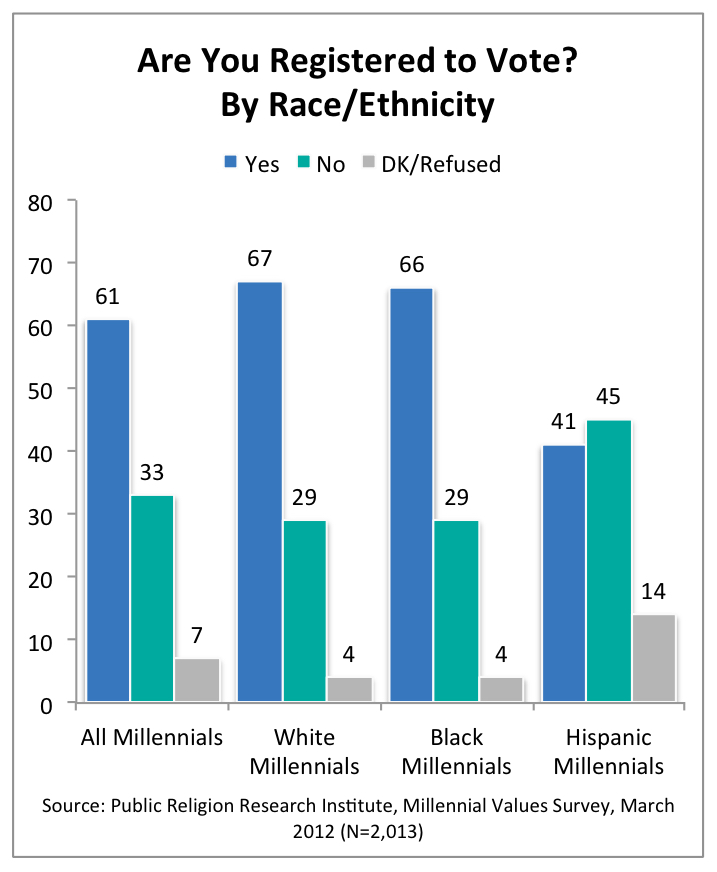 Compared to white and black Millennials, Hispanic Millennials are much less likely to say they will probably vote in the upcoming election. Only one-third of Hispanic Millennials say they are absolutely certain to vote, compared to 46% of black and 52% of white Millennials. More than 4-in-10 Hispanic Millennials say their chances of voting are 50-50 (15%) or less than 50-50 (29%).
Compared to white and black Millennials, Hispanic Millennials are much less likely to say they will probably vote in the upcoming election. Only one-third of Hispanic Millennials say they are absolutely certain to vote, compared to 46% of black and 52% of white Millennials. More than 4-in-10 Hispanic Millennials say their chances of voting are 50-50 (15%) or less than 50-50 (29%).
Millennials with at least a bachelor’s degree are significantly more likely to say they will vote in 2012, compared to those with a high school education. More than 6-in-10 (62%) Millennial college graduates say they are absolutely certain they will vote, while fewer than 4-in-10 (37%) Millennials with a high school education say the same.
Among Millennials who are registered to vote, roughly two-thirds (63%) say they are absolutely certain they will vote. Nearly 1-in-5 (21%) say they will probably vote, and more than 1-in-10 (14%) say the chances are 50-50 or less.
Voting Preferences in 2012
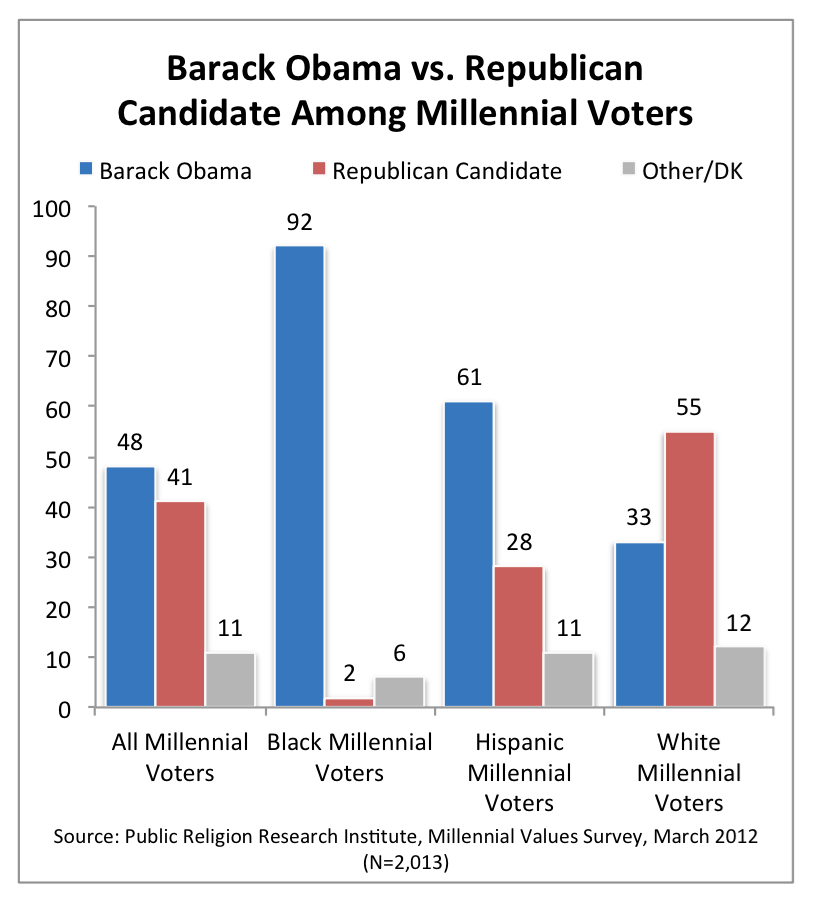 Among college-age Millennial voters at this point in the 2012 campaign, Barack Obama holds a 7-point lead over a generic Republican candidate.5 Nearly half (48%) of Millennial voters say they would prefer that Obama win the 2012 election, compared to about 4-in-10 (41%) who say they would like to see a Republican candidate win.6 More than 1-in-10 (11%) say they are not sure, or say that they would like to see a third-party candidate win the election.
Among college-age Millennial voters at this point in the 2012 campaign, Barack Obama holds a 7-point lead over a generic Republican candidate.5 Nearly half (48%) of Millennial voters say they would prefer that Obama win the 2012 election, compared to about 4-in-10 (41%) who say they would like to see a Republican candidate win.6 More than 1-in-10 (11%) say they are not sure, or say that they would like to see a third-party candidate win the election.
There are substantial racial and ethnic divisions in voting preferences. Barack Obama holds overwhelming leads over a generic Republican opponent among black Millennial voters (92% vs. 2% respectively) and Hispanic Millennial voters (61% vs. 28% respectively). In contrast, a majority (55%) of white Millennial voters say they would prefer that a Republican candidate win the 2012 election, compared to one-third who say they would like to see Obama win re-election.
Among white Millennial voters with a college degree, Obama and a generic Republican candidate have roughly the same support with 45% saying they would prefer that Obama win the election, versus 44% who say they would like to see a Republican candidate win. Majorities of white Millennial voters with some college education or with a high school education report a preference for the GOP candidate in the 2012 election (56% and 59% respectively). Interestingly, there are no gender differences in the preferences of white Millennial voters.
The voting preferences of Millennials differ markedly by religious affiliation. Fewer than 3-in-10 white mainline Protestant (27%) and white evangelical Protestant (11%) voters report that they would prefer to see Obama re-elected in 2012. More than 6-in-10 (63%) white mainline Protestant voters and nearly 8-in-10 (79%) white evangelical Protestant voters say they would like to see a Republican candidate elected. Half of Catholic voters say they prefer it if Obama won the election, while fewer than 4-in-10 (39%) Catholic voters favor a Republican candidate. Roughly two-thirds of religiously unaffiliated voters (64%) say they would like to see Obama re-elected, as do an overwhelming majority (95%) of black Protestant voters.
Among Millennial voters who favor a Republican candidate, most would prefer it if Mitt Romney or Ron Paul won the nomination (34% and 30% respectively). Roughly 1-in-5 (19%) say they would like to see Rick Santorum win the nomination, and 14% say they would prefer Newt Gingrich to be the Republican nominee.
More than 7-in-10 (72%) of the Millennial voters who support Obama’s re-election say that they would be excited to cast a vote for him, compared to 27% who say they would not. Romney is the preferred GOP candidate among voters who would like to see a Republican win the 2012 election, but he also inspires less excitement than Obama. A majority (54%) of Millennial voters supporting Mitt Romney’s candidacy say they would be excited to vote for him, while among voters who prefer Santorum win the election, 65% say they would be excited to cast a vote for him. Sixty-two percent of voters who prefer Paul report that they would be excited to vote for him.
Feelings about the Candidates and the Political Parties
Obama holds a sizeable favorability advantage over Mitt Romney, the presumptive Republican nominee. A majority (52%) of college-age Millennial voters say they have a favorable opinion of Barack Obama, while 43% have an unfavorable opinion. Mitt Romney is viewed much less positively. Fewer than one-third (32%) of Millennial voters say they have a favorable view of Romney, while a majority (53%) hold an unfavorable opinion of him. Sixteen percent of Millennial voters say they have not heard of or have no opinion about Romney.
Romney’s Republican primary opponents are not viewed any more positively, although they remain less well known. About one-third (32%) of Millennial voters say they have a favorable view of Ron Paul, and fewer than 3-in-10 Millennial voters say they have a favorable view of Rick Santorum (27%) and Newt Gingrich (24%). A significant number of Millennial voters say they have not heard of or have no opinion of Paul (22%), Gingrich (16%), or Santorum (22%).
There are dramatic differences in Millennials’ views of the candidates by race and ethnicity. Among white Millennial voters, Romney and Obama are viewed equally favorably (39% each), although a majority of white Millennial voters view Obama unfavorably, compared to less than half who view Romney that way (56% vs. 49% respectively). Hispanic and black Millennial voters have much more positive feelings about Obama than Romney. Nine-in-ten (92%) black Millennial voters, and almost two thirds (65%) of Hispanic Millennial voters, have a favorable view of Obama. About 1-in-10 (13%) black Millennial voters and 1-in-5 (20%) Hispanic Millennial voters have a favorable view of Romney.
There are also significant educational gaps in views about Romney and Obama. More than 6-in-10 (63%) of Millennials with at least a bachelor’s degree have a favorable opinion of Obama, compared to fewer than 3-in-10 (29%) who feel similarly about Romney. In contrast, the favorability gap is much smaller among Millennial voters with a high school degree. Fewer than half (45%) of this group have a favorable view of Obama, compared to one-third (33%) who have a favorable view of Romney.
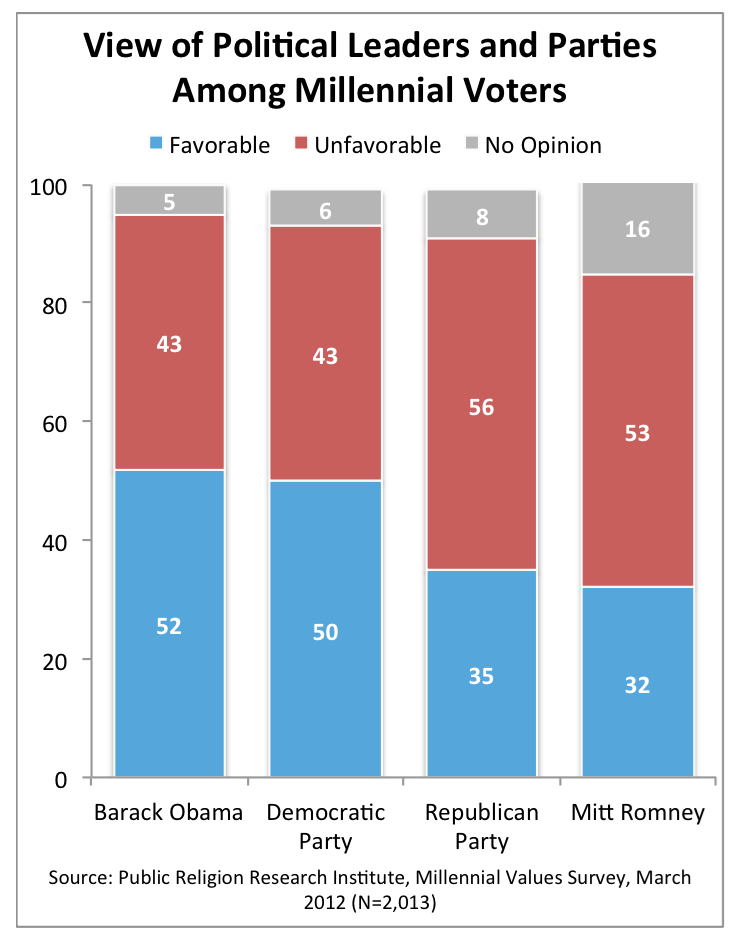 There is a large favorability gap in Millennials’ opinions about the two major political parties. Half (50%) of Millennial voters say they have a favorable view of the Democratic Party, compared to 35% who have a favorable view of the Republican Party. A majority (56%) of Millennial voters have an unfavorable view of the GOP, while roughly 4-in-10 (43%) have an unfavorable view of the Democratic Party.
There is a large favorability gap in Millennials’ opinions about the two major political parties. Half (50%) of Millennial voters say they have a favorable view of the Democratic Party, compared to 35% who have a favorable view of the Republican Party. A majority (56%) of Millennial voters have an unfavorable view of the GOP, while roughly 4-in-10 (43%) have an unfavorable view of the Democratic Party.
Among Democratic Millennials, Obama’s favorability (84%) is roughly equivalent to the Democratic Party’s favorability (89%). Among Republican Millennials, however, Romney’s favorability lags nearly 20 points behind the favorability of the Republican Party. Nearly 8-in-10 (82%) Republican Millennials have a favorable view of the GOP, while 64% say they have a favorable view of Romney.
Feelings about the Obama Administration
Millennial voters are somewhat divided in their opinion about how Barack Obama is handling his job as President. Half of Millennial voters report that they approve of the way Obama is handling his job as President, while about 4-in-10 (42%) say they disapprove. At this point, views of the Obama presidency are fractured. One-third (33%) of Millennial voters feel satisfied with the Obama presidency, while nearly as many (27%) say they are disappointed. Fewer than 1-in-5 (16%) say they feel worried, while fewer than 1-in-10 say they feel excited (7%) or angry (9%).
Millennial voters’ opinions vary considerably according to political party affiliation. A majority (53%) of Democratic Millennial voters feel satisfied with Obama’s performance, while fewer than one-quarter say they feel disappointed (17%) or worried (9%). By contrast, only 9% of Republican Millennial voters say they feel satisfied, while roughly 6-in-10 feel disappointed (40%) or worried (23%). Independent voters’ opinions generally mirror Millennial voters’ overall views.
Almost 6-in-10 (57%) of Millennials who say they voted for Barack Obama in 2008 report that they are satisfied with his presidency. Fewer than 1-in-5 (18%) say they are disappointed or worried (7%), and 14% say they are excited. Among McCain voters, 6% say they are satisfied. Roughly 6-in-10 say they are disappointed by (37%) or worried about (24%) the Obama presidency.
IV. Economic Inequality and the Role of Government
Economic Inequality and Opportunity
The American Dream
College-age Millennials (age 18 to 24) are divided on whether the American Dream – the idea that if you work hard you’ll get ahead – holds true today. A plurality (45%) believe that the American Dream once held true, but not anymore, while 4-in-10 (40%) say the American Dream still holds true today. One-in-ten (10%) Millennials say that the American Dream never held true.
Partisan differences on this question are modest, but Millennials vary more significantly by political ideology. Millennials who identify as conservative are more likely than moderate or liberal Millennials to say that the American Dream still holds true (53%, 38%, and 34%, respectively). Liberal and moderate Millennials, by contrast, are more likely than conservative Millennials to say that the American Dream once held true, but not anymore (50%, 49%, and 36%, respectively).
Millennials who attend religious services at least once a week are more optimistic about the status of the American Dream than Millennials who seldom or never attend religious services. Nearly half (49%) of Millennials who attend services at least weekly say that the American Dream still holds true, while fewer than one-third (32%) of Millennials who seldom or never attend religious services say the same.
Inequality, Equal Opportunity, and America’s Economic System
Nearly three-quarters (73%) of college-age Millennials agree that the economic system in the U.S. unfairly favors the wealthy. There are no significant differences on this question by race, gender, educational attainment or religious affiliation. There are, however, substantial variations by party affiliation. More than eight-in-ten (85%) Democratic Millennials say that the economic system unfairly favors the wealthy, compared to around 6-in-10 (59%) Republican Millennials. Independent Millennials fall in between, with approximately 7-in-10 (71%) agreeing that the economic system unfairly favors the wealthy.
More than 6-in-10 (63%) Millennials agree that one of the big problems in this country is that we don’t give everyone an equal chance in life. Approximately 3-in-10 (28%) disagree, saying that it is not really that big a problem if some people have more of a chance in life than others.
Partisan differences on the issue of equal opportunity are striking. Republican Millennials are divided on whether it’s a big problem if some people have more of a chance in life than others: nearly half (48%) say that one of the big problems in this country is that we don’t give everyone an equal chance in life while 4-in-10 (40%) say it is not really that big a problem. On the other hand, nearly 8-in-10 (78%) Democratic Millennials agree that lack of equal opportunity is one of the biggest problems in this country, while only around 1-in-5 (19%) say that it’s not really that big a problem if some people have more of a chance than others.
There are substantial differences by race and religious affiliation. Fewer than 6-in-10 (58%) white Millennials agree that one of the big problems in this country is that we don’t give everyone an equal chance in life, compared to 73% of black Millennials and 72% of Hispanic Millennials. Approximately half of white evangelical Protestants (54%) and white mainline Protestants (48%) say that lack of equal opportunity is a big problem, compared to 77% of black Protestants and 73% of Latino Protestants. Similarly, among Catholic Millennials, 57% of white Catholics agree that lack of equal opportunity is a big problem, compared to 78% of Latino Catholics.
Despite these obvious concerns about economic inequality, Millennials are not anti-wealth. Nearly 9-in-10 (87%) of Millennials say they admire people who get rich by working hard; a majority (52%) of Millennials say they completely agree with this statement. There are no significant demographic, religious or educational differences on this question.
Women in the Workplace
Younger Millennials are, overall, conflicted about the extent to which women face challenges in the workplace. On the one hand, a solid majority (56%) of Millennials agree that women get fewer opportunities than men for good jobs, while 41% disagree. On the other hand, however, just as many (56%) believe that there are no longer any barriers to how far women can advance in the workplace, while 38% disagree.
Millennial men and women vary somewhat on these questions. Millennial men are nearly evenly divided on whether women get fewer opportunities for good jobs (49% agree, 48% disagree), while a roughly 6-in-10 (63%) of Millennial women agree that women get fewer opportunities. Millennial women are, however, more likely than Millennial men to agree that there are no longer any barriers to how far women can advance in the workplace (61% vs. 52% respectively).
There are large differences by party affiliation, but near consensus among religious groups. For example, fewer than half (47%) of Republican Millennials agree that women get fewer opportunities than men for good jobs, compared to nearly two-thirds (64%) of Democratic Millennials. In contrast, majorities of every religious group except white evangelical Protestant Millennials (45%) agree that women get fewer opportunities than men for good jobs.
Role in the Government in the Economy
The Government’s Role in Reducing the Wealth Gap
Nearly 7-in-10 (69%) college-age Millennials (age 18-24) believe that the government should do more to reduce the gap between the rich and the poor, while 28% disagree. There are, however, sizeable variations by party affiliation and race. Over 8-in-10 (84%) Democratic Millennials agree that the government should do more to reduce the gap between the rich and the poor, compared to slightly over half of Republican Millennials (51%). Black (79%) and Hispanic (79%) Millennials are more likely than white Millennials (64%) to say that the government should do more to reduce the gap between the rich and the poor, although majorities of all racial groups agree with this statement.
Majorities of all religious groups agree that the government should do more to reduce the gap between the rich and the poor, including 53% of white evangelical Protestants.
The Increasing Size of the Government
When asked to choose between two explanations for why government has grown larger over the years, a majority (56%) of college-age Millennials agree that government has gotten bigger because it has gotten involved in things that people should do for themselves. Around 4-in-10 (38%) disagree, saying that government has grown bigger over the years because the problems we face have become bigger.
Nearly two-thirds (65%) of white Millennials agree that government has gotten bigger because it has gotten involved in things that people should do for themselves. A majority (55%) of black Millennials say that government has grown bigger because our problems have become bigger. One-third (34%) of black Millennials believe that government has gotten bigger because it has gotten involved in things that people should do for themselves. Hispanic Millennials are divided: almost half (49%) say that government has grown because our problems have grown, while 45% believe that government has grown because of its increasing involvement in things that people should do for themselves.
Three-quarters (75%) of Republican Millennials agree that government has become bigger over the years because it has gotten involved in things that people should do for themselves. Democratic Millennials are more divided. Half (50%) agree that government has become bigger over the years because the problems we face have become bigger, while 46% say that government has grown because of increasing involvement in things that people should do for themselves.
Dependence on Government Assistance Programs
Despite strong support for government action to reduce the gap between the rich and the poor, two-thirds (67%) of college-age Millennials also believe that poor people have become too dependent on government assistance programs. White Millennials are more likely to agree with this statement than Hispanic or black Millennials (71%, 64%, and 50%, respectively). Similarly, there are sizeable differences between Republican and Democratic Millennials on whether poor people have become too dependent on government programs: more than 8-in-10 (83%) Republican Millennials agree, compared to a much smaller majority of Democratic Millennials (55%).
There are modest differences by religious affiliation. Strong majorities of white evangelical Protestant (86%), white mainline Protestant (76%), and Catholic (72%) Millennials all agree that poor people have become too dependent on government assistance programs. Solid, but less overwhelming majorities of black Protestants (58%) and religiously unaffiliated (60%) Millennials also agree.
The Buffett Rule
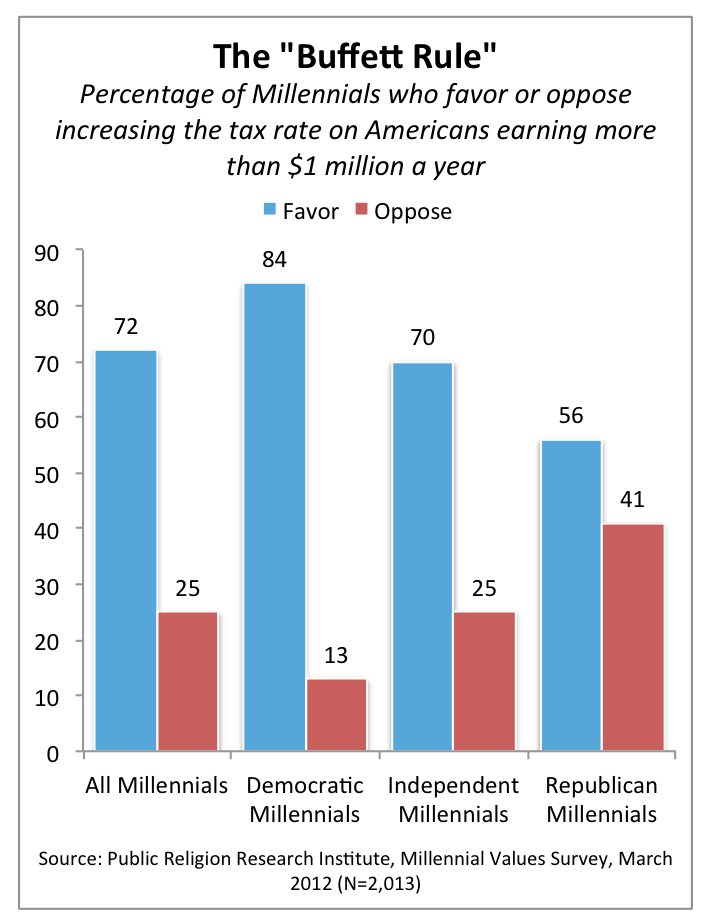 Younger Millennials are strongly in favor of a policy sometimes called the “Buffett Rule,” which would increase the tax rate on Americans earning more than $1 million a year. Over 7-in-10 (72%) Millennials favor this proposal. There are no substantial differences by race, gender, or education. Majorities of all religious groups favor increasing the tax rate on Americans earning more than $1 million a year.
Younger Millennials are strongly in favor of a policy sometimes called the “Buffett Rule,” which would increase the tax rate on Americans earning more than $1 million a year. Over 7-in-10 (72%) Millennials favor this proposal. There are no substantial differences by race, gender, or education. Majorities of all religious groups favor increasing the tax rate on Americans earning more than $1 million a year.
Majorities of Republican, Independent and Democratic Millennials also support the “Buffett Rule.” There are, however, significant differences in intensity. Over 8-in-10 (84%) Democratic Millennials agree with this policy, compared to 7-in-10 (70%) Independent Millennials and 56% of Republican Millennials. A majority (55%) of Democratic Millennials strongly favor this policy.
Feelings Towards Groups Related to the Economy
In the survey, respondents were asked to rate their feelings toward certain groups on a 100-point scale, where ratings between 51 degrees and 100 degrees indicated that the respondent felt favorable and warm toward that group, while ratings between 1 degree and 49 degrees meant that the respondent did not feel favorably toward the group. Ratings of 50 degrees indicated that the respondent did not feel particularly warm or cold toward the group. Respondents’ feelings about four of these groups – Occupy Wall Street, the Tea Party, labor unions, and the federal government in Washington – shed more light on college-age Millennials’ perspectives on the economy.
Occupy Wall Street
On the 100-point scale described above, respondents give the Occupy Wall Street movement an average rating of 44, indicating that younger Millennials’ feelings toward the movement are only slightly unfavorable. There are stark divides by political ideology. Millennials who identify as liberal feel, on average, nearly twice as warmly toward the Occupy Wall Street movement, compared to Millennials who identify as conservative (60 vs. 32 respectively).
Black Millennials give Occupy Wall Street a higher average rating than white Millennials (55 and 41 respectively). Among religious groups, white evangelical Protestant Millennials (30) have, on average, a much cooler feeling about Occupy Wall Street than Catholic (46), religiously unaffiliated (52), or black Protestant (57) Millennials.
The Tea Party
Millennials’ attitudes toward the Tea Party movement are, on average, cooler than their feelings toward the Occupy Wall Street movement. When asked to rate the Tea Party, Millennials give the movement an average rating of 41. Republican Millennials feel more warmly toward the Tea Party than Democratic Millennials (54 vs. 33 respectively), while Independent Millennials (41) resemble Millennials overall. No religious group expresses significant warmth for the Tea Party movement. White evangelical Protestants feel more warmly towards the Tea party, on average (50), than any other religious group.
Notably, Millennials who have at least a bachelor’s degree gave the Tea Party a lower average rating than Millennials who do have a high school degree or less (32 vs. 44 respectively).
Labor Unions
Overall, Millennials have somewhat warmer feelings toward labor unions, with an average rating of 54. Democratic Millennials hold significantly more positive feelings toward labor unions than Republican Millennials (60 vs. 44 respectively). Black Protestant Millennials (60) feel more warmly toward labor unions than Catholic (54), white mainline Protestant (53), and white evangelical Protestant (48) Millennials.
The Federal Government in Washington
Millennials give the federal government in Washington an average rating of 41, although there is some variation according to race, party affiliation, and religious affiliation. White Millennials feel less warmly toward the federal government than black Millennials (34 vs. 57 respectively). Although Democratic and Republican Millennials both feel negatively toward the federal government in Washington, Democratic Millennials’ negative feelings are less cool than Republican Millennials’ feelings (48 vs. 35 respectively). Black Protestant Millennials, on average, elicit much warmer feelings toward the federal government than white evangelical Protestant or white mainline Protestant Millennials (59, 32, and 32, respectively).
V. Morality and Legality of Social Issues
Approches to Morality
College-age Millennials are nearly evenly divided between those who take a more universal approach to morality and those who embrace a more contextual outlook. Half (50%) of Millennials say that what is right or wrong depends on the situation, compared to 45% who say that there are some things that are always wrong, regardless of the situation. There are stark differences in Millennials’ approaches to morality by education type, political affiliation and religious affiliation.
Among Millennials who attended or are currently attending a private college or university, nearly two-thirds (64%) agree that what is right or wrong depends on the situation. By contrast, fewer than half of Millennials who attend or attended community college (47%) or a religious college or university (49%) agree with this statement. A majority (53%) of Millennials who attended or are currently attending a public college or university believe that morality is dependent on the particular context or situation.
Religious differences are even more dramatic. Nearly 7-in-10 (68%) white evangelical Millennials believe that there are some things that are always wrong, compared to fewer than half of black Protestant (49%), Catholic (45%), religiously unaffiliated (35%) and non-Christian affiliated (32%) Millennials. A majority of Catholic Millennials (54%) and more than 6-in-10 unaffiliated (62%) and non-Christian affiliated (66%) Millennials say that what is right or wrong depends on the situation.
Roughly 6-in-10 (62%) Republican Millennials believe that there are some things that are just wrong, regardless of the situation. Nearly as many Democratic Millennials (59%) say that what is right or wrong depends on the situation.
The Government and Morality
College-age Millennials are significantly more likely to say that they worry about government getting too involved in the issue of morality than to say that the government should do more to protect morality in society (57% vs. 35% respectively). However, significant divisions emerge among Millennials by religious affiliation. More than 7-in-10 (72%) religiously unaffiliated Millennials and roughly two-thirds of white Catholic (66%) and non-Christian affiliated (65%) Millennials say they worry that the government is getting too involved in the issue of morality. A majority of white mainline Protestant (59%) and white evangelical (52%) Millennials also say they worry about too much government involvement in moral issues. In contrast, fewer than half of black Protestant (48%), Latino Catholic (46%) and Latino Protestant (41%) Millennials say they are worried about too much government involvement in morality.
Legality of Social Issues
Abortion
A majority of college-age Millennials say that abortion should be legal in all (24%) or most cases (30%). More than 4-in-10 say that abortion should be illegal in most (28%) or all cases (16%). Roughly 6-in-10 (59%) Millennials believe that at least some health care professionals in their community should provide legal abortions, compared to one-third (33%) who say they should not. There are sizeable divisions among Millennials by religious affiliation, political identity, and educational background.
More than two-thirds of non-Christian affiliated (68%) and religiously unaffiliated (82%) Millennials say that abortion should be legal in all or most cases. Roughly 6-in-10 white mainline Protestant Millennials (59%) and black Protestant Millennials (61%) also agree that abortion should be legal in all or most cases. Catholic Millennials are more divided: Forty-eight percent say that abortion should be legal in all or most cases, while a slim majority (51%) say it should be illegal in all or most cases. There are no differences between Latino and white Catholic Millennials in views on the legality of abortion. Of all the religious groups, white evangelical and Latino Protestant Millennials are most strongly opposed to legal abortion. Nearly 9-in-10 (88%) white evangelical Protestant Millennials and more than 7-in-10 (71%) Latino Protestant Millennials believe that abortion should be illegal in all or most cases. Similar patterns are evident in views about whether some health care professionals should provide legal abortions.
There are also stark divisions among younger Millennials, not only by education level (i.e. college vs. non-college) but also according to the type of college or university they attended or are currently attending. Fewer than half of Millennials with a high school education or less (49%) and Millennials who attended or are currently attending a religious college or university (43%) say that abortion should be legal in all or most cases. Millennials who attended or are currently attending a community college are about evenly divided on the issue, with 51% in favor of legal abortion, and 48% opposed. In contrast, roughly two-thirds of Millennials who attended or are currently attending a public college or university (65%) or a private college or university (68%) say that abortion should be legal in all or most cases.
The partisan gap is also substantial. More than 7-in-10 (71%) Democratic Millennials and 53% of Independent Millennials say that abortion should be legal in all or most cases. In contrast, fewer than 3-in-10 (29%) Republican Millennials say that abortion should be legal in all or most cases. Seventy-one percent of Republican Millennials say that abortion should be illegal in all or most cases.
Same-sex Marriage
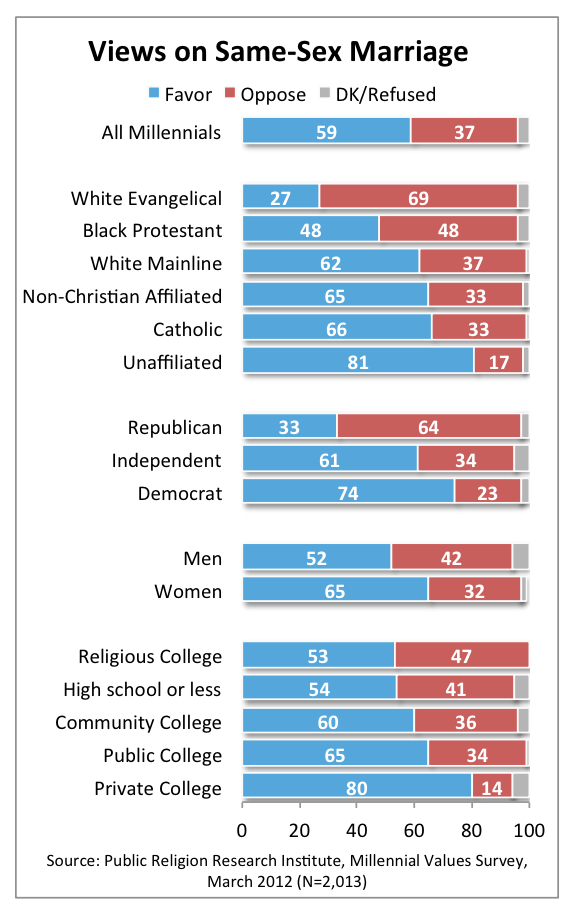 Nearly 6-in-10 (59%) college-age Millennials favor allowing gay and lesbian couples to marry legally, compared to 37% who are opposed. The patterns of support and opposition generally mirror those found in attitudes about abortion, with strong differences evident by education level and type, religious affiliation, and party affiliation.
Nearly 6-in-10 (59%) college-age Millennials favor allowing gay and lesbian couples to marry legally, compared to 37% who are opposed. The patterns of support and opposition generally mirror those found in attitudes about abortion, with strong differences evident by education level and type, religious affiliation, and party affiliation.
Millennials who attended or are currently attending a private college or university are most supportive of same-sex marriage, with fully 8-in-10 (80%) in favor of allowing gay and lesbian couples to marry legally. At least 6-in-10 Millennials who attended or are attending a community college (60%) or public college or university (65%) also favor same-sex marriage. In contrast, significantly smaller majorities of Millennials who attended or are currently attending a religious college (53%), as well as Millennials who have a high school education or less (54%) favor same-sex marriage.
With the exception of white evangelical, Latino, and black Protestant Millennials, majorities of every religious group favor same-sex marriage. More than 6-in-10 white mainline Protestant (62%), Catholic (66%), non-Christian affiliated (65%) and religiously unaffiliated (81%) Millennials favor allowing gay and lesbian couples to marry. In contrast, only 34% of Latino Protestant Millennials and 27% of white evangelical Protestant Millennials favor same-sex marriage. Black Protestant Millennials are evenly divided, with equal numbers voicing support (48%) and opposition (48%).
Unlike the issue of abortion, there is a significant gender gap on this issue. Nearly two-thirds (65%) of Millennial women favor same-sex marriage, compared to 52% of Millennial men. Millennials with a close friend or family member who is gay or lesbian are also significantly more likely than those without a gay or lesbian friend or family member to favor allowing gay and lesbian couples to marry legally (70% vs. 47% respectively).
Pornography
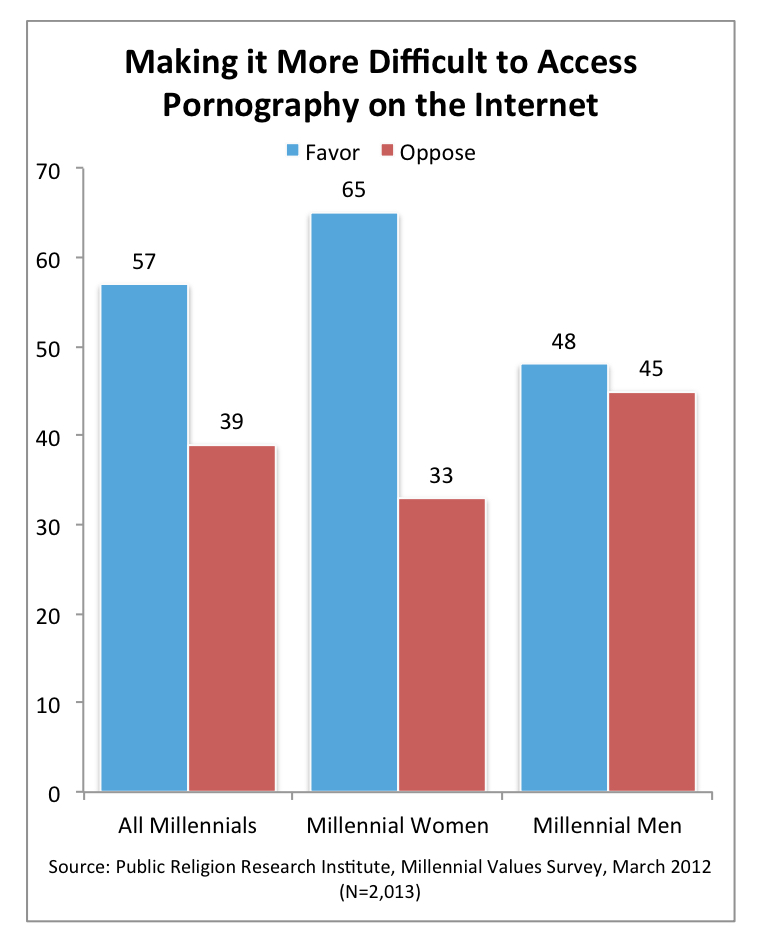 Nearly 6-in-10 (57%) college-age Millennials support making it more difficult to access Internet pornography, compared to less than 4-in-10 (39%) who are opposed. There is an evident gender gap, in addition to stark differences between religiously affiliated and religiously unaffiliated Millennials on this issue.
Nearly 6-in-10 (57%) college-age Millennials support making it more difficult to access Internet pornography, compared to less than 4-in-10 (39%) who are opposed. There is an evident gender gap, in addition to stark differences between religiously affiliated and religiously unaffiliated Millennials on this issue.
Millennial women are significantly more supportive of making Internet pornography more difficult to access, compared to Millennial men (65% vs. 48% respectively). Millennial men are about evenly divided, with 48% in favor and 45% opposed.
At least 6-in-10 white mainline Protestant (63%), black Protestant (63%), Catholic (66%) and white evangelical Protestant (79%) Millennials favor making Internet pornography more difficult to access. In contrast, fewer than half (43%) of religiously unaffiliated Millennials favor making Internet pornography more difficult to access, while 54% are opposed.
Contraceptive Coverage and Access
A majority (54%) of younger Millennials agree that “methods of birth control should be generally available to teenagers age 14 or older without parental approval.” More than 4-in-10 (43%) disagree with this statement. Interestingly, there are no differences between Millennial men and women. There are, however, stark differences by education type and religious affiliation.
Millennials who attended or are currently attending a private (62%) or public (57%) college or university are significantly more likely to support the availability of birth control to teenagers than Millennials who attended or are currently attending a religious college or university (40%). There are no significant differences in the views of Millennials with varying levels of educational attainment (e.g. between college graduates and high school graduates).
Nearly three-quarters (74%) of religiously unaffiliated Millennials, and much smaller majorities of Catholic (55%) and white mainline Protestant (51%) Millennials, agree that birth control should be available to teenagers who are at least 14 years of age without parental approval. Fewer than half (46%) of black Protestant Millennials, and fewer than one-third (30%) of white evangelical Millennials, agree that birth control should be available to teenagers age 14 years or older.
Millennials are broadly supportive of requiring religiously affiliated institutions to provide no-cost contraception coverage for their employees. Six-in-ten (60%) college-age Millennials say that religiously affiliated colleges and hospitals should be required to provide their employees with health care plans that cover contraception at no cost. Fewer than 4-in-10 (36%) say these institutions should not have to provide this type of coverage. There are substantial partisan differences on whether religiously affiliated colleges and hospitals should be required to provide their employees with no-cost birth control. Nearly three-quarters (74%) of Democratic Millennials agree with the requirement, compared to roughly 4-in-10 (42%) Republican Millennials.
Millennials are about evenly divided over whether churches and other places of worship should be required to provide their employees with contraception coverage in their health care plans, with 47% saying that they should be required and 49% opposed to the requirement.
Private Morality and Public Policy
When asked about the moral acceptability of many of these same issues, Millennials are often closely divided.
A slim majority (51%) of Millennials say that having an abortion is morally wrong, while fewer than 4-in-10 (37%) see it as morally acceptable. Nearly 1-in-10 (9%) report that it depends on the particular situation or offer some other sort of explanation. Similarly, less than half (49%) of Millennials say that sex between a young man and young woman under the age of 18 is morally wrong, compared to about 4-in-10 (39%) who believe it is morally acceptable. A slim majority (51%) say that viewing pornography is morally wrong, while more than 4-in-10 (41%) say it is morally acceptable. Millennials are nearly evenly divided over whether sex between two adults of the same gender is morally acceptable (48%) or morally wrong (44%). There is greater consensus among Millennials on whether sex between an unmarried man and woman is moral. Nearly two-thirds (64%) say that this is morally acceptable, while less than 3-in-10 (29%) say it is morally wrong.
Although there are strong correlations between private moral evaluations of same-gender sexual relationships and abortion and public policies that address these issues, significant minorities of those who personally believe that same-sex marriage and abortion are immoral nonetheless think they should still be legal.
There is a strong correlation between views about the morality of same-gender sexual relations and support for same-sex marriage. Among Millennials who say that sex between two adults of the same gender is morally acceptable, 92% say they favor allowing gay and lesbian couples to marry. Among Millennials who say that same-gender sex is morally wrong, nearly three-quarters (74%) oppose same-sex marriage, although one-quarter (25%) report that they are in favor of it.
There is a similar relationship between views about the morality of abortion and support for legalized abortion. Among Millennials who believe having an abortion is morally acceptable, nearly all (96%) say abortion should be legal in all or most cases. Roughly three-quarters of Millennials who say abortion is morally wrong believe that it should be illegal in all or most cases. Again, a significant minority (23%) of Millennials who say abortion is morally wrong nevertheless believe that it should be legal in all or most cases.
VI. Religious and Ethnic Pluralism
Feelings about Religious Subgroups
In the survey, respondents were asked to rate a variety of religious subgroups on the same 100-point scale described earlier. Generally, younger Millennials expressed warm feelings toward Christians, who receive an average rating of 68, and Jews, who receive an average rating of 61. They are more ambivalent, overall, in their feelings toward Muslims, Mormons, and atheists. Muslims, Mormons, and atheists received similar average ratings (48, 46, and 46, respectively), suggesting that Millennials, on average, have lukewarm feelings toward these groups.
There were some striking variations among subgroups, particularly between religiously unaffiliated and white evangelical Protestant Millennials. Perhaps unsurprisingly, religiously unaffiliated Millennials are significantly more likely than white evangelical Protestants to give atheists a favorable rating (69 vs. 26 respectively).
Level of educational attainment makes a difference in terms of Millennials’ feelings toward certain religious groups. Millennials who have at least a bachelor’s degree are also more likely to favorably rate minority religious groups than are Millennials who do not have a high school degree. Millennials without a high school degree rate atheists more coolly, on average, than Millennials with a bachelor’s degree (41 vs. 55 respectively). Similarly, Millennials without a high school degree have cooler feelings toward Muslims (42) and Jews (55), compared to Millennials with at least a bachelor’s degree (54 and 65 respectively).
Democratic Millennials rate Muslims more positively than do Republican Millennials (56 vs. 37 respectively). They also hold friendlier views toward atheists than do Republican Millennials (51 vs. 36 respectively). Notably, Democratic and Republican Millennials give Mormons roughly the same average rating (49 vs. 46 respectively).
Feelings about Present-Day Christianity
Millennials hold conflicting views about present-day Christianity. When asked whether present-day Christianity is “relevant to your life,” nearly 6-in-10 (58%) college-age Millennials agree, while 40% disagree. However, when asked to consider the extent to which they associate present-day Christianity with certain positive or negative adjectives and descriptions, majorities of Millennials agree that both – the good and the bad – describe present-day Christianity “somewhat” or “very” well.
Almost two-thirds (64%) of Millennials say that “anti-gay” describes present-day Christianity somewhat or very well. Over 6-in-10 (62%) also believe that present-day Christianity is “judgmental,” while 58% agree that “hypocritical (saying one thing, doing another)” describes present-day Christianity well. Half of Millennials say that “too involved in politics” describes present-day Christianity well.
There is, however, an equally strong consensus about positive characteristics associated with present-day Christianity. Around three-quarters (76%) of younger Millennials say that modern-day Christianity “has good values and principles,” while 63% agree that “consistently shows love for other people” describes present-day Christianity well.
Christian Millennials and religiously affiliated Millennials disagree on many aspects of present-day Christianity, although there are some points of agreement. About 8-in-10 religiously unaffiliated Millennials believe that the terms “judgmental” (84%), “hypocritical” (84%), and “anti-gay” (79%) describe present-day Christianity somewhat or very well. Nearly three-quarters (73%) of religiously unaffiliated Millennials also say that present-day Christianity is too involved in politics. More than two-thirds (68%) believe that Christianity teaches the same basic idea as other religions. A majority (56%) say that present-day Christianity has good values and principles, although only 8% that say this description fits very well. Relatively few religiously unaffiliated Millennials say that present-day Christianity consistently shows love for other people (41%) or is relevant to their life (18%).
Millennial Christians, for the most part, offer a starkly different appraisal of their faith. Nearly 9-in-10 (88%) say that Christianity has good values and principles, and more than three quarters say that Christianity is relevant to their life (77%) and consistently shows love for other people (76%). At the same time, a majority of Christian Millennials agree that present-day Christianity is anti-gay (58%) and judgmental (54%). Fewer than half believe it is hypocritical (49%) or too involved in politics (40%).
There is the greatest agreement between Christian and religiously unaffiliated Millennials on whether Christianity teaches the same basic ideas as other religions (65% vs. 68% respectively), and whether Christianity is anti-gay (58% vs. 79% respectively).
Partisan differences for the most part mirror differences between Christian Millennials and religiously unaffiliated Millennials, except on the question of whether present-day Christianity is anti-gay. Notably, the gap between Republican Millennials and Democratic Millennials who believe that present-day Christianity is “anti-gay” (61% vs. 69% respectively) is narrower than the gap between Christian and religiously unaffiliated Millennials.
Association with Mormons
In the survey, respondents were asked to report which word, in their mind, best describes Mormons. For the largest number (15%) of younger Millennials, Mormons could be described with a word that fell into the category of “religious/faith/Christian.” About one-in-ten (9%) describe Mormons as a “cult/misguided,” while the same number (9%) say that Mormons are “strange/different.” Eight percent of Millennials associate “polygamy” with Mormons. Millennials also associate Mormons with “Utah/Mormons/LDS” (6%), “people/normal/OK” (5%), “friendly/kind/nice” (4%), “strict” (4%), and “conservative/traditional” (3%).
In addition to these specific categories, 12% of Millennials offer a generally negative term, while 6% report a generally positive term.
American Muslims and Islam in Society
College-age Millennials are divided on whether the values of Islam are at odds with American values and way of life (49% disagree, 47% agree). Nearly two-thirds (66%) of Millennials, however, agree that Muslims in their local community should be permitted to build an Islamic center or mosque, provided they followed the same rules and regulations required of other religious groups.
There are significant partisan differences on these questions. Over 6-in-10 (62%) Republican Millennials believe that the values of Islam are at odds with American values, compared to around 4-in-10 (42%) Democratic Millennials. Similarly, Democratic Millennials are more supportive of allowing Muslims in their local community to build a mosque or Islamic center, compared to Republican Millennials (75% vs. 55% respectively).
Millennials without a high school degree are less likely than those with at least a bachelor’s degree to support allowing Muslims in their local community to build an Islamic center or mosque (49% vs. 74% respectively).
Immigrants and Change in Society
Change vs. Traditional Values
A solid majority (62%) of college-age Millennials (age 18-24) agree that what makes America great is that it is open to change and new ways of doing things. Around 3-in-10 (28%) disagree, saying that what makes America great is that it protects traditional values and ways of doing things. There are substantial partisan divides on this question. Nearly three-quarters (74%) of Democratic Millennials agree that America’s greatness comes from its openness to change, compared to only 41% of Republican Millennials.
Majorities of every religious group except white evangelical Protestant Millennials agree that what makes America great is that it is open to change, including 61% of white mainline Protestant Millennials, 67% of black Protestant Millennials, 68% of Catholic Millennials and 76% of religiously unaffiliated Millennials. Fewer than one-third (32%) of white evangelical Millennials agree while a majority (54%) of white evangelical Protestant Millennials say that America’s greatness comes from its ability to protect traditional values.
Millennial women are significantly more likely than Millennial men to say that what makes America great is that it is open to change and new ways of doing things (68% vs. 57% respectively)
Impact of Newcomers on American Society
College-age Millennials are divided on the impact that the growing number of newcomers from other countries has on American society. Nearly half (48%) say that the growing number of newcomers strengthens American society, compared to 42% who say that the growing number of newcomers threatens traditional American customs and values.
There are sizeable variations by race and party affiliation. Hispanic Millennials (64%) are significantly more likely than black (47%) and white (41%) Millennials to believe that the growing number of newcomers from other countries strengthens American society. Democratic Millennials are also more likely than Republican Millennials to believe that the growing number of newcomers strengthens American society (59% vs. 29% respectively).
There are also substantial divisions between religious subgroups. White evangelical Protestant (59%) and white mainline Protestant (58%) Millennials are significantly more likely to believe that the growing number of newcomers from other countries threatens traditional American customs and values, compared to Catholic (44%) and religiously unaffiliated (32%) Millennials. Notably, Latino Catholic Millennials are more than twice as likely as white Catholic Millennials to believe that the growing number of newcomers from other countries strengthens American society (70% vs. 33% respectively).
The DREAM Act
Younger Millennials strongly support the central components of the DREAM Act – allowing illegal immigrants brought to the U.S. as children to gain legal resident status if they join the military or go to college (61% favor, 35% oppose). Republican Millennials are more divided. Forty-nine percent of Republican Millennials support the proposal, while 48% oppose it. In contrast, about two-thirds (66%) of Democratic Millennials support the policy, while only 3-in-10 (31%) are opposed.
With the exception of white evangelical Protestants, Millennials across all major religious groups favor the DREAM Act. Fifty-five percent of white mainline Protestant Millennials favor the proposal, as do 61% of black Protestant Millennials, 67% of non-Christian affiliated Millennials, 68% of Catholic Millennials, and 71% of religiously unaffiliated Millennials.
There are no differences in support by education attainment level. Nearly equal numbers of Millennials with a college degree and those who have not finished high school favor allowing illegal immigrants brought to the U.S. as children to gain legal resident status if they join the military or go to college.
Ethnic and Racial Minorities
Feelings about Minorities
When asked to evaluate their feelings toward certain ethnic minorities on the same 100-point scale described earlier, Millennials, on average, report warm feelings toward both Hispanics (62) and African-Americans (67).
There are few significant demographic or educational differences, although Democratic Millennials are modestly more likely than Republican Millennials to report warm feelings toward Hispanics (66 vs. 55 respectively). White evangelical Protestant Millennials also rate Hispanics slightly more positively than do white mainline Protestant Millennials (63 vs. 50 respectively).
Government Attention to Minorities’ Problems
College-age Millennials are divided on whether the government has paid too much attention to the problems of blacks and other minorities over the past few decades (49% disagree, 46% agree). There are substantial racial differences on this issue. Only around one-quarter (24%) of black Millennials and slightly more than one-third (37%) of Hispanic Millennials agree that the government has paid too much attention to the problems of blacks and other minorities, compared to 56% of white Millennials.
There are also striking differences according to political party affiliation. Republican Millennials are twice as likely as Democratic Millennials to believe that over the past couple of decades, the government has paid too much attention to the problems of blacks and other minorities (65% vs. 32% respectively).
About 6-in-10 white mainline Protestant (61%) and white evangelical Protestant (58%) Millennials also believe that the government has paid too much attention to the problems of blacks and other minorities. Catholics are nearly evenly divided (50% agree, while 49% disagree), although white Catholics are substantially more likely than Latino Catholics to agree (65% vs. 38% respectively). A slim majority of religiously unaffiliated Millennials (53%) and a much stronger majority of black Protestants (71%) disagree, saying that the government has not paid too much attention to the problems of blacks and other minorities.
Perceptions of Reverse Discrimination
When asked whether discrimination against whites has become as big a problem today as discrimination against blacks, younger Millennials are nearly evenly divided (48% agree, 47% disagree). As with the previous question on government intervention on behalf of blacks and other minorities, there are dramatic differences by race, political party affiliation, religious affiliation, and educational type. A solid majority (58%) of white Millennials believe that discrimination against whites has become as big a problem as discrimination against blacks and other minorities, compared to only 24% of black Millennials and about 4-in-10 (39%) Hispanic Millennials.
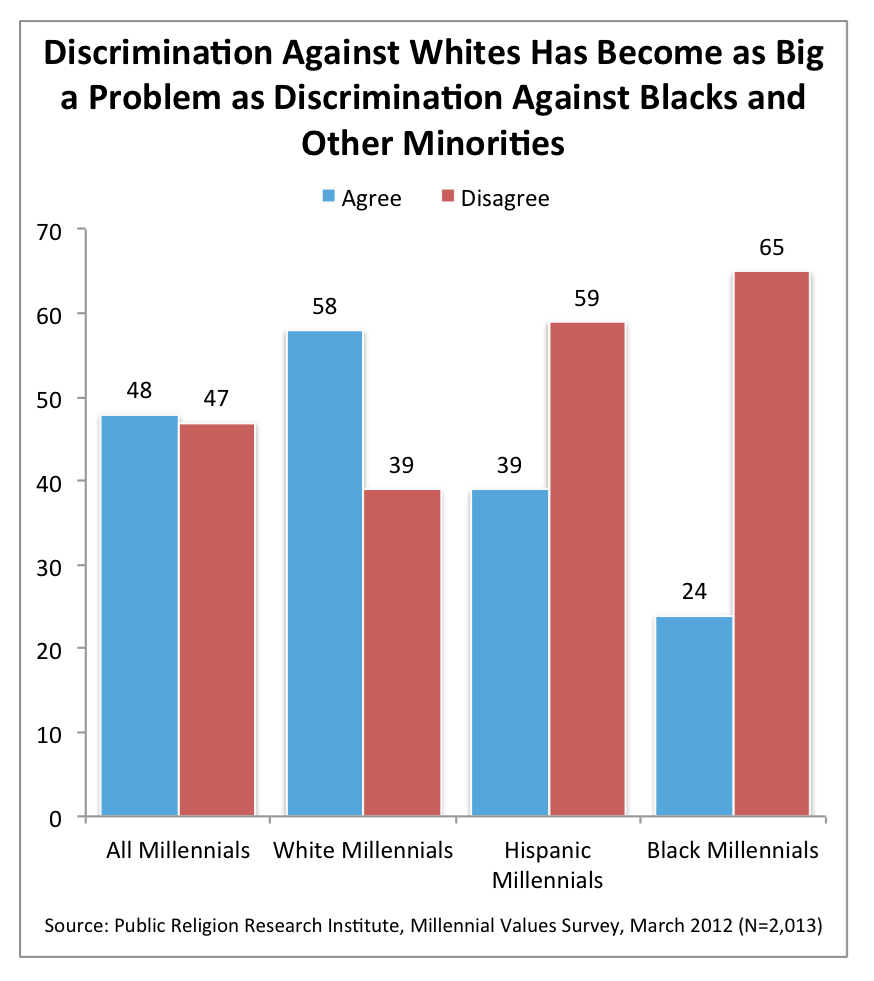 Almost two-thirds (66%) of Republican Millennials agree that discrimination against whites has become as big a problem as discrimination against blacks and other minorities, compared to only 36% of Democratic Millennials. Strong majorities of white evangelical Protestant (68%) and white mainline Protestant (63%) Millennials agree with this statement. A slim majority (52%) of Catholics also agree, although white Catholics are substantially more likely than Latino Catholics to say that discrimination against whites is as big a problem as discrimination against blacks and other minorities (62% vs. 41% respectively). A majority (55%) of religiously unaffiliated Millennials disagree, along with roughly 7-in-10 (72%) black Protestant Millennials.
Almost two-thirds (66%) of Republican Millennials agree that discrimination against whites has become as big a problem as discrimination against blacks and other minorities, compared to only 36% of Democratic Millennials. Strong majorities of white evangelical Protestant (68%) and white mainline Protestant (63%) Millennials agree with this statement. A slim majority (52%) of Catholics also agree, although white Catholics are substantially more likely than Latino Catholics to say that discrimination against whites is as big a problem as discrimination against blacks and other minorities (62% vs. 41% respectively). A majority (55%) of religiously unaffiliated Millennials disagree, along with roughly 7-in-10 (72%) black Protestant Millennials.
Millennials with a bachelor’s degree are significantly less likely to agree that discrimination against whites has become as big a problem as discrimination against blacks and other minorities, compared to Millennials who have not completed high school (43% vs. 57% respectively).
VII. Religious Beliefs, Practices, and Identity
College-age Millennials demonstrate significantly lower levels of traditional religious engagement than older Americans. From frequency of prayer and worship attendance to views on God and the Bible, Millennials tend to engage in religious activity less often and embrace less traditional beliefs. Religion is also less central to Millennials’ lives, although a significant number still say that it is an important part of their lives.
Few Millennials report regular religious engagement. One-in-four (25%) Millennials say that they attend religious services at least once a week. Three-in-ten (30%) say they attend occasionally (once or twice a month or a few times a year), and more than 4-in-10 say they seldom (16%) or never attend (27%). One-third (33%) of Millennials report that they pray at least daily. About 1-in-4 (27%) say they pray occasionally (at least a few times a week, once a week or a few times a month), and nearly 4-in-10 (37%) say they seldom or never pray.
Nearly half (45%) of Millennials who attended or are currently attending a religiously affiliated college or university report attending worship services at least once a week, compared to 13% of Millennials who attended or are currently attending a private college or university, and 21% who attended or are currently attending a public college or university. Rates of worship attendance do not differ significantly by level of educational attainment, with roughly equal numbers of college graduates (22%) and high school graduates (26%) reporting that they attend services at least weekly. Notably, Millennials who live at home with their parents are not more likely to attend religious services than Millennials overall.
A majority (54%) of Millennials believe that God is a person with whom one can have a relationship. About 1-in-5 (22%) say that God is an impersonal force, and 14% say they do not believe in God. Views of the Bible are more fragmented. Fewer than one-quarter (23%) believe that the Bible is the word of God and should be taken literally, word for word. About 1-in-4 (26%) say the Bible is the word of God, but not everything in the Bible should be taken literally. Roughly 4-in-10 (37%) say that the Bible is a book written by men and is not the word of God.
Fewer than half (40%) of Millennials say that religion is either very important or the most important thing in their life. One-quarter say that religion is somewhat important to them, and one-third (33%) say it is not too important or not at all important in their life. Not surprisingly, there are strong differences between Millennials by religious affiliation. Nearly 8-in-10 white evangelical (78%) and black Protestant (77%) Millennials say that religion is either very important or the most important thing in their life, compared to 37% of white mainline Protestant Millennials and 44% of Catholic Millennials. Only 3% of religiously unaffiliated Millennials say religion is either very important or the most important thing in their life. More than 8-in-10 religiously unaffiliated Millennials say that religion is not too important (24%) or not at all important (60%).
Religious Identity on Facebook
More than 8-in-10 (85%) of college-age Millennials have a Facebook account, and more than 6-in-10 (63%) say they use it at least once a day. By contrast, only 16% use Twitter daily, and only 5% use the social networking tool Tumblr daily.
Among Millennials who use Facebook at least seldom, fewer than half (45%) include a religious identity on their profile page. There are, however, significant differences among Millennials by religious affiliation. For instance, three-quarters of white evangelicals include a religious identity, compared to fewer than half (49%) of white mainline Protestant and Catholic (44%) Millennials. Only 30% of religiously unaffiliated Millennials include a religious identity on their Facebook profile page.
Among Millennials who include their religious identity on their Facebook page, about 4-in-10 (38%) simply identify as “Christian,” 16% identify as “Catholic,” and 8% identify with a specific Protestant denomination (e.g. Presbyterian, Baptist). Sixteen percent identify their religion as atheist or agnostic. Three percent specifically mention Jesus or God but do not mention any specific religious tradition. More than 1-in-10 (12%) include a religious identity that is not explicitly linked to a specific religious tradition. Examples of other religious identities include “Pastafarian,” “Open,” “Humanist,” “Searching,” or a quote from the Bible.
Endnotes
1 Throughout the report, the terms “younger Millennials,” “college-age Millennials,” and “Millennials” will be used interchangeably to describe Americans between the age of 18 and 24.
2 U.S. Census Bureau, American Community Survey, 2009.
3 Throughout the report, the terms “white” and “black” will be used to refer to respondents who are white, non-Hispanic and black, non-Hispanic.
4 The “non-Christian affiliated” category includes religions such as Judaism, Buddhism, Hinduism, Islam, and other world religions that are too small to measure separately due to sample size limitations in the current survey.
5 Voters are defined as those who are registered to vote either at their present address or at a different address.
6 Two percent of Millennial voters volunteered that they would like to see Republican candidate Ron Paul win the election.
Recommended citation:
Jones, Robert P., Daniel Cox, and Thomas Banchoff. “A Generation in Transition: Religion, Values, and Politics among College-age Millennials.” PRRI. 2012. http://www.prri.org/research/millennial-values-survey-2012/.
